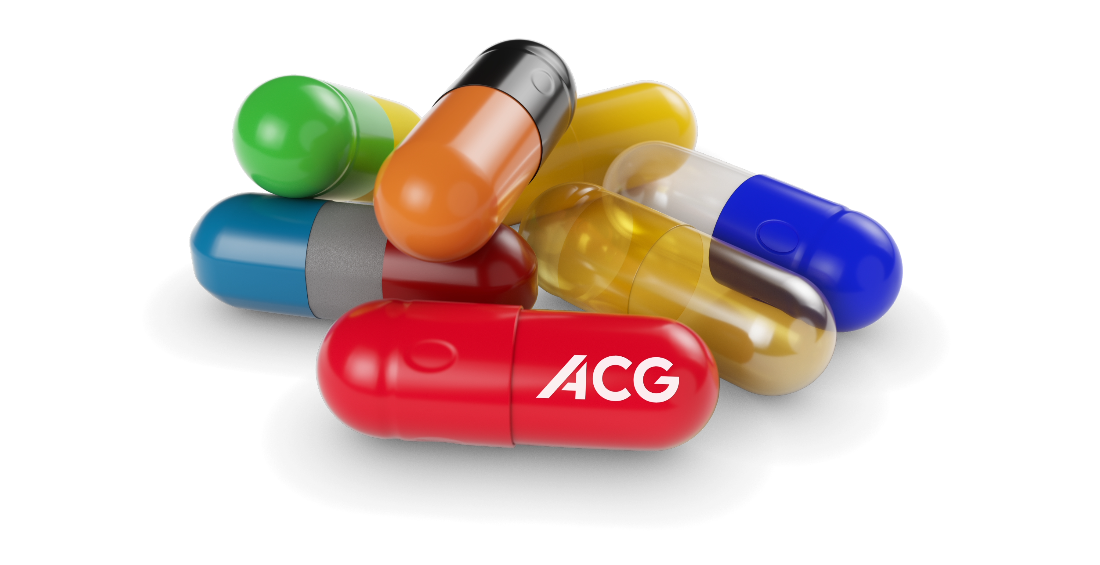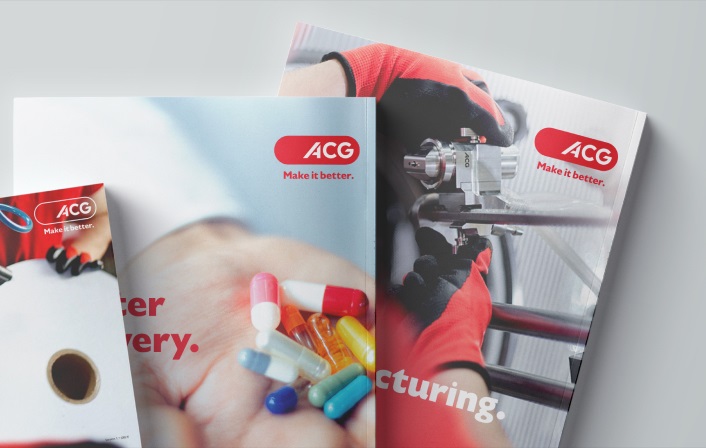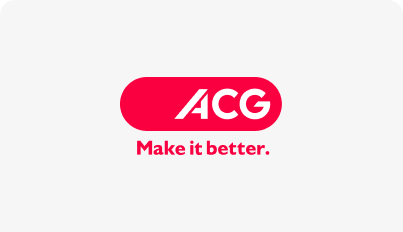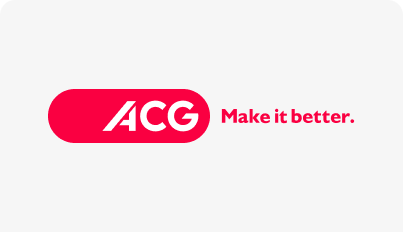We value our partnerships with the media and welcome any inquiries about the ACG Group. Please use the resources on this page, or if you have any specific queries please reach out to the media contact listed below.
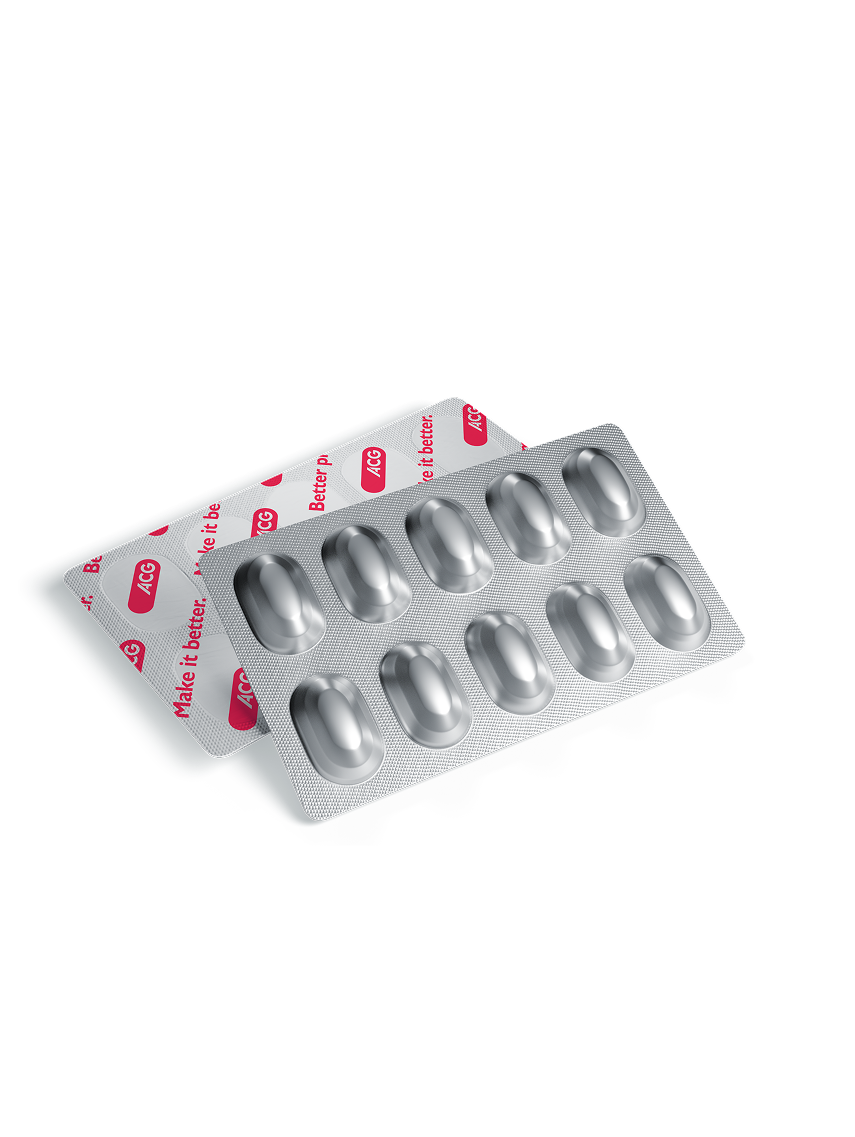
ACG launches DryPod™ – A Breakthrough Desiccant-Based Cold-Form Laminate Delivering Superior Protection for Moisture-Sensitive Pharmaceutical Blisters at PMEC 2025
ACG, the world’s most integrated provider of solid-dosage and packaging solutions, today announced the launch of DryPod™, a next-generation desiccant-based cold-form laminate engineered to protect highly moisture-sensitive drug molecules. DryPod™ marks a major advancement for pharmaceutical manufacturers who have long grappled with limited availability, rigid technologies, and compatibility issues within existing desiccant cold-form solutions.Moisture protection is essential to ensure drug potency throughout the product’s retail life. However, current market offerings rely heavily on a single patented co-extrusion-based technology, creating challenges such as restricted machine compatibility, dependence on specific lidding foils, long lead times, limited supplier options, and inconsistent on-ground technical support. DryPod™ overcomes these barriers, giving pharmaceutical companies the freedom to innovate without compromising product protection, regulatory compliance, or operational efficiency.Unlike legacy co-extruded structures, DryPod™ is built using a proprietary lamination-based approach, enabling consistent performance across all standard blister-forming technologies. This eliminates the need for specialised retrofits or process changes and gives manufacturers complete flexibility to run DryPod™ on their existing blister lines. The laminate can also be sealed with any PE-sealable lidding foil, reducing procurement dependencies and ensuring supply-chain agility across global operations.A significant differentiator for DryPod™ is its patent-clean design. Engineered with zero overlap with existing active patents in the desiccant co-extrusion space, DryPod™ offers pharmaceutical companies complete legal clarity and peace of mind when switching suppliers, scaling production, or expanding into new markets. This removes a longstanding barrier for companies seeking secure, long-term, and globally compliant moisture-protection solutions.DryPod™ is supported by ACG’s extensive global technical service network, ensuring smooth onboarding, rapid troubleshooting, and optimised packaging performance across diverse manufacturing environments. With its advanced protection capabilities and universal compatibility, DryPod™ represents a future-ready solution for safeguarding highly moisture-sensitive molecules.“DryPod™ is built for the realities of modern pharmaceutical manufacturing,” said Dr. Akbar Ali, General Manager and Head of Development and Technologies at ACG. “Manufacturers working with moisture-sensitive molecules have faced years of constraints due to rigid technologies and supply limitations. DryPod™ directly addresses these challenges, empowering innovators to bring critical therapies to market more efficiently and reliably.”With this launch, ACG strengthens its commitment to making global pharmaceutical manufacturing safer, smarter, and more flexible. DryPod™ is now commercially available worldwide.About ACGFor over 60 plus years, ACG has been innovating the production solutions for pharmaceutical and nutraceutical companies, that help make people better. As the world’s most integrated provider of oral dosage products and services, we produce capsules, barrier packaging materials, manufacturing machinery, and visual inspection and traceability solutions. All fully compliant with international standards. Today, ACG fosters long-term collaborative partnerships with customers in 138 countries across six continents. Together, we share a common purpose: to solve the world’s greatest health challenges and make it better for everybody we serve. For more information, please contact the ACG media relations team: madhurima.chakraborty@acg-world.com
Read more
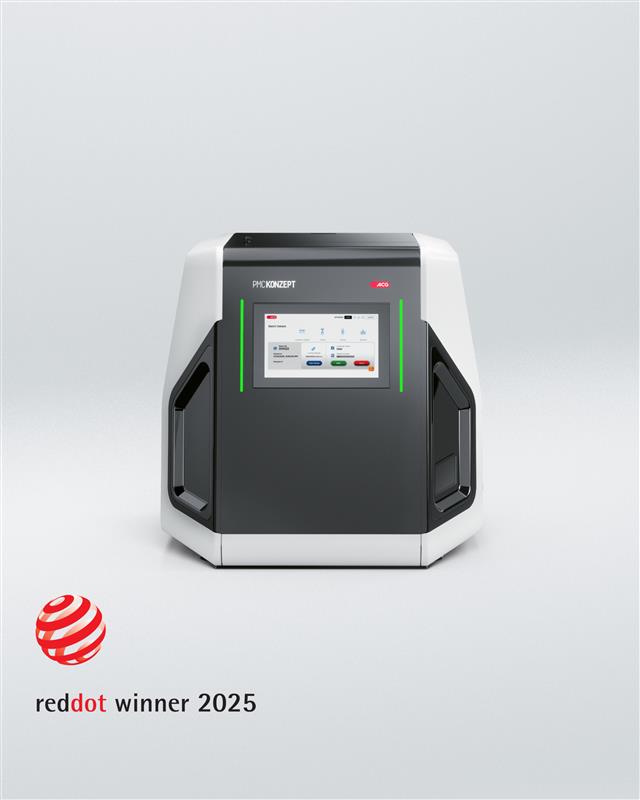
ACG wins Red Dot Design Award for Personalised Medicine Concept
ACG, the world’s most integrated provider of solid-dosage solutions, is proud to announce that its Personalised Medicine Concept (PMC) has been awarded the prestigious Red Dot Award for high design quality in the Medical Devices and Technology category. The Red Dot is an internationally recognised symbol of design excellence, awarded only to concepts that demonstrate exceptional creativity and innovation.The PMC reflects the strength of the OneACG ecosystem, bringing together expertise from ACG Capsules, ACG Engineering, ACG’s global research and development centres (Scitech India and Europe), and Vantage Nutrition, an ACG group company. This collaboration unites cutting-edge capabilities in capsule and beadlet technology, precision engineering, and digital systems to deliver a fully integrated, intelligent OSD (oral solid dosage) manufacturing solution - from development through to delivery.The Personalised Medicine Concept represents a groundbreaking advancement in personalised nutrition and medicine. By addressing the limitations of the traditional one-size-fits-all approach, the PMC enables the production of tailor-made capsules. Each batch features a unique combination and dosage of ingredients, ensuring precision, safety, and efficacy-while minimising the risks of over or under-dosing typically associated with generic prescriptions.Developed independently by ACG’s R&D teams, the PMC underwent extensive prototyping and validation. Select partners were invited to experience the technology first-hand, following which ACG entered an exclusive collaboration with Art of You (AOY) for the European market. This partnership brings together ACG’s engineering excellence with AOY’s pioneering approach to personalised supplement development.Karan Singh, Managing Director at ACG, said: “We are honoured to receive the Red Dot recognition. In the healthcare sector, everyone talks about personalisation. Few can manufacture it. That’s what makes this moment different. Our engineers, scientists, and nutrition experts have built an end‑to‑end capsule platform that can read a person’s health profile and deliver the exact combination and dose – reliably and at scale. Red Dot recognises the design quality; I am proud of ACG’s discipline and grit in making personalisation a reality”Pablo Smolders, Founder at Art of You, added “We’re proud to collaborate with ACG in bringing the PMC to life - setting a new benchmark for fully personalised, capsule-based supplements across Europe. This achievement highlights the incredible dedication and innovation that went into developing a pharmacy-grade machine designed specifically for personalised health and wellness.”Werner Bongers, CEO of Scitech, concluded “The PMC is a testament to what OneACG stands for- seamless collaboration, smart integration, and a shared vision for the future of health. As ACG’s R&D centre, Scitech leads innovation from concept to creation, and this award reinforces our belief that purposeful design can transform the future of personalised medicine.”About ACGFor 65 years, ACG has been innovating production solutions for pharmaceutical and nutraceutical companies that help make people better. As the world’s most integrated provider of oral-dosage products and services, we produce capsules, barrier packaging materials, manufacturing machinery, and visual inspection and traceability solutions, all fully compliant with international standards. Today, ACG partners with customers in 138 countries across six continents. Together, we share a common purpose: to solve the world’s greatest health challenges and make it better for everyone we serve.Media contact:ACG Media Relations - madhurima.chakraborty@acg-world.com
Read more

ACG to invest $200 million in U.S. hard-shell capsule manufacturing
Dedicated facilities for gelatin and HPMC; 200+ jobs; operations targeted for early 2027; expands ACG’s 25-year U.S. presenceACG, the world’s most integrated provider of solid-dosage solutions, today announced a $200 million phased investment to establish its first empty-capsule manufacturing operations in the United States. The initial $100 million will fund a state-of-the-art hard-shell capsule facility in Atlanta, Georgia, with a second phase of $100 million planned to expand capacity and capabilities in the region. The investment is expected to create more than 200 jobs, with operations targeted to begin in early 2027.“ACG has served North America for over 25 years. This facility strengthens our ties with customers across the region—bringing us closer to them, enabling faster lead times, higher-quality service, and a more resilient, de-risked supply chain. Just as importantly, it lets us respond more quickly and co-develop new innovations through tighter R&D partnerships. It’s been a long time coming, and we’re glad to say it’s here,” said Karan Singh, Managing Director, ACG.ACG will establish dedicated facilities to manufacture gelatin and vegetarian (HPMC) hard-shell capsules, designed and operated to the highest global standards of quality, safety, and regulatory compliance. The program advances ACG’s Make it Better commitment and complements the company’s U.S. ecosystem spanning capsules, barrier packaging materials, processing and encapsulation machinery, visual inspection, and traceability solutions—supported by nationwide sales and service.“Atlanta is the right location to execute at scale,” said Selwyn Noronha, CEO, ACG Capsules. “Georgia and the City of Atlanta offer a pro-business environment, a strong talent pipeline, world-class connectivity, and reliable infrastructure. Combined with ACG’s recent facility builds in Aurangabad (HPMC), Thailand (gelatin), and expansions in Brazil, Croatia and India, we have the operating discipline to begin production quickly and deliver reliable supply for North American customers.”ACG has operated in the United States for more than 25 years, with North American headquarters in Piscataway, N.J., manufacturing liquid fill capsules in Chadds Ford, Pa., with several warehouses across the United States, and sales and service teams nationwide.About ACGFor 65 years, ACG has been innovating production solutions for pharmaceutical and nutraceutical companies that help make people better. As the world’s most integrated provider of oral-dosage products and services, we produce capsules, barrier packaging materials, manufacturing machinery, and visual inspection and traceability solutions, all fully compliant with international standards. Today, ACG partners with customers in 138 countries across six continents. Together, we share a common purpose: to solve the world’s greatest health challenges and make it better for everyone we serve.
Read more

Exclusive: ACG welcomes EC decision on titanium dioxide in pharmaceuticals
ACG, the world’s largest integrated supplier of pharmaceutical capsules and allied solutions, welcomes the European Commission’s recent announcement allowing the continued use of titanium dioxide in medicinal products.ACG has been deeply involved with this matter since the very inception of the concern, working on two fronts.On one side, the company has invested in the development of TiO2-free alternatives to support customer needs.On the other, ACG has played a key role in educating the global pharmaceutical community about the scientific possibilities and limitations in addressing the challenge.ACG is proud to have actively co-operated with the IQ Consortium, comprising 21 multinational pharmaceutical companies, in the creation of a robust database on the potential impact of a ban on TiO₂ in medicines.This scientific body of evidence played a vital role in informing the European Commission’s decision-making process.“This is a wise and pragmatic decision for the pharmaceutical sector,” said Dr Subhashis Chakraborty, General Manager, Head, Global Product Management at ACG Capsules.“And as the ongoing ban remains in place for the nutraceutical industry, we remain fully committed to supporting through innovative TiO₂-free capsule solutions.”Talking exclusively to NBR, Dr Subhashis Chakraborty (pictured) added: When the regulation on TiO₂ was first announced, it created significant uncertainty across the industry.ACG responded swiftly and responsibly, taking the time to understand the challenge in depth. Rather than taking advantage of the situation, we chose to proactively share the technical limitations and complexities associated with finding viable TiO₂-free alternatives.We made it very clear to our customers that an exact replacement for TiO₂, particularly to achieve white colour options, would not be possible with the current material science."This helped to set realistic expectations and prevent unnecessary reformulation risks."Our transparent communication enabled pharmaceutical companies, including the IQ Consortium, to make informed and strategic decisions, rather than operating in the dark.In doing so, we represented ourselves not only as market leaders but also as thought leaders, guiding the industry with expertise and insight, rather than simply responding to regulatory changes.In addition, while the regulatory changes originated in Europe, ACG also emphasised the broader global implications, especially for multinational corporations.We advised that organisations with global operations should remain aligned and proactively plan for potential ripple effects beyond the EU.As part of our commitment to supporting the industry, ACG has hosted multiple global knowledge-sharing sessions, including webinars, technical roundtables and direct consultations.These efforts continue to guide and educate the pharmaceutical community on both the regulatory landscape and the path forward for TiO₂-free innovations.
Read more
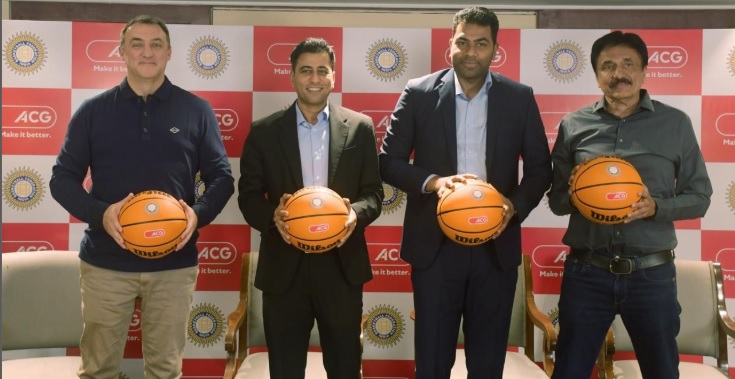
India's Basketball Revolution Begins: ACG launches India's First Professional Basketball League in association with BFI
Mumbai, June 6, 2025: Marking a transformative moment for Indian sports, ACG Sports Private Limited, has announced the launch of India’s first professional basketball league in association with the Basketball Federation of India (BFI). This groundbreaking initiative will feature structured competitive league in 5x5 and 3x3 formats for both men and women, establishing a comprehensive professional ecosystem that opens the door for athletes across the country to pursue basketball as a viable career.Designed to redefine how the sport is played, experienced, and supported in India, the league aims to shift basketball from a niche discipline into a mainstream pursuit. It will serve as a long-term catalyst for India’s presence on the global basketball stage, backed by world-class infrastructure, holistic athlete development, and robust community engagement.The league is being driven by ACG Sports Pvt. Ltd., a division of ACG, a global leader in integrated manufacturing solutions for the pharmaceutical and nutraceutical industries. Leveraging ACG’s deep-rooted commitment to societal advancement, this initiative represents a natural extension of its decade-long investment in grassroots basketball programs.To guide the league’s global strategy and operations, Mr. Jeremy Loeliger, Former CEO & Commissioner of Australia’s National Basketball League (NBL), has been appointed Director of ACG Sports. In his new role, Loeliger will lead the development of the league’s blueprint, bringing international standards of governance, competition, and commercial innovation to the Indian shores.“Basketball represents more than just a sport – it is a vehicle for building character, leadership, and opportunity," said Mr. Karan Singh, Managing Director of ACG. "Our decade-long journey, beginning with grassroots initiatives has focused on systematically making basketball accessible across India while building the professional pathways that young athletes need to thrive."He further added, "Our vision for this professional basketball league is to establish a self-sustaining ecosystem where every child with passion and talent can see a viable future in basketball in India. We're grateful for the partnership with BFI in making this dream a reality. While this is a commendable first step, we know that building a thriving basketball ecosystem will require sustained effort and collective support to reach its full potential.”ACG’s leadership role in this initiative goes far beyond league operations. As part of its long-term strategy, ACG will launch India’s first fully residential high-performance centre within the year. The academy will feature world-class facilities, attract top coaching talent from the U.S. and Australia, and offer comprehensive training programmes for players, coaches, and referees. Nutrition, mental wellness, and academic balance will be integral to the curriculum – ensuring holistic development of future stars.Mr. Aadhav Arjuna, President of the Basketball Federation of India, stated: “This partnership with ACG is unlike anything we’ve seen before. It is driven by vision, structured for long-term impact, and rooted in a clear understanding of what Indian basketball truly needs. We’re building not just visibility, but real momentum and global credibility. Our vision is to win medals at the Asian Games and Olympics”Mr. Kulvinder Singh Gill, Secretary General of the Basketball Federation of India, stated: “This league will unlock new opportunities for young Indian talent to grow, compete professionally, and gain invaluable exposure alongside international players and coaches.”The complete league framework including team structures, competition formats, player eligibility, and governance models – is currently in development with input from global basketball experts and key industry stakeholders. Detailed announcements on participation guidelines, venue requirements, and operational protocols will follow in a phased rollout.In the coming months, the newly formed League Council will begin overseeing standards and operations, while nationwide scouting initiatives, customised athlete development tracks, and dynamic fan engagement programs will begin laying the foundation for a vibrant, inclusive, and commercially sustainable basketball culture in India.About Basketball Federation of India (BFI)The Basketball Federation of India (BFI) is the governing and controlling body of basketball in India. It is responsible for the development and promotion of the sports at all levels. BFI manages all the national-level basketball operations in India.First national level tournaments were organized in India in 1934. The India national basketball team became a member of FIBA in 1936. The governing body, BFI, was formed in 1950. Mr. Aadhav Arjuna is the President of Basketball Federation of India.About ACGFor over 60 plus years, ACG has been innovating the production solutions for pharmaceutical and nutraceutical companies, that help make people better.As the world’s most integrated provider of oral dosage products and services, we produce capsules, barrier packaging materials, manufacturing machinery, and visual inspection and traceability solutions. All fully compliant with international standards.Today, ACG fosters long-term collaborative partnerships with customers in 138 countries across six continents.Together, we share a common purpose: to solve the world’s greatest health challenges and make it better for everybody we serve.ACG Sports Private Limited is a wholly owned subsidiary of ACG, and while it operates in a different sector, it is firmly grounded in the same institutional principles of precision, scalability, and long-term value creation.For more information, please contact the ACG media relations team:madhurima.chakraborty@acg-world.com
Read more
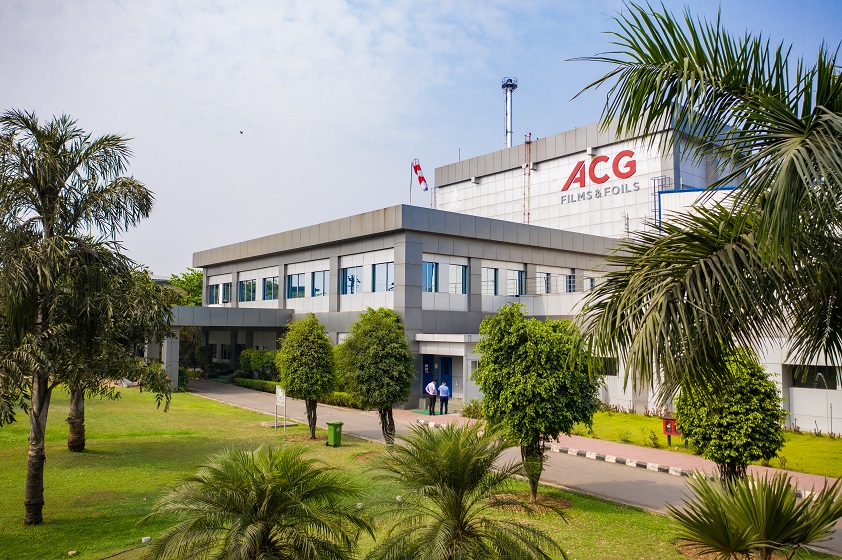
ACG Packaging Materials GHG Commitment Validated and Approved by SBTi
ACG Packaging Materials, a leading global supplier of integrated manufacturing solutions for the pharmaceutical and nutraceutical industries, has taken a significant step forward in its sustainability journey as the Science Based Targets initiative (SBTi) officially validated the company’s greenhouse gas (GHG) emission reduction targets. This validation aligns with ACG’s core philosophy of Making it Better, reinforcing its commitment to impactful progress toward a sustainable future.ACG Packaging Materials has committed to reducing absolute Scope 1 and 2 GHG emissions by 90%. The company has also committed to reducing Scope 3 GHG emissions from purchased goods and services, fuel and energy-related activities, and upstream transportation and distribution by 97% per tonne of products produced within the same timeframe.Speaking on this milestone, Karan Singh, Managing Director of ACG, said, “At ACG, we recognise that the future of the pharmaceutical and nutraceutical industries depends on our ability to innovate responsibly and operate sustainably. This validation provides us with a clear, science-backed framework to drive meaningful progress in reducing our environmental impact. As we move forward, our focus will be on integrating sustainable practices across our operations, investing in advanced technologies, and collaborating with stakeholders to build a resilient, low-carbon future. This milestone is a testament to our dedication to making it better while ensuring that our industry remains aligned with global climate goals”Mr. Shivshankar S.R, CEO of ACG Packaging Materials, “The SBTi validation solidifies our commitment to a business model that thrives in a carbon-conscious future. We're not simply aiming for incremental improvements; we're undertaking a fundamental shift in how we operate. Our ambitious interim targets—reducing absolute Scope 1 and 2 emissions by 54.6% and Scope 3 emissions by 61.07% per tonne of products by FY2033—demonstrate our dedication to tangible progress. This commitment enhances our ability to attract sustainability-focused investors, fortifies our supply chain, and establishes ACG as a leader in responsible manufacturing”Sunil Kumar, Head of CSR and Sustainability at ACG said, “This validation is a testament to our unwavering commitment to environmental stewardship and social responsibility. At ACG, we believe that business success is intrinsically linked to the well-being of our planet and communities. Our focus now is on expanding our sustainability initiatives beyond our operations, engaging our employees, and partnering with local communities to create a lasting positive impact. We are dedicated to building a more sustainable and equitable future for all”The Science Based Targets initiative (SBTi), a collaboration between the Carbon Disclosure Project (CDP), United Nations Global Compact (UNGC), World Resources Institute (WRI), and Worldwide Fund (WWF), provides a globally recognized framework for companies to set GHG reduction targets aligned with climate science. It specifies how much and how quickly emissions must be reduced to limit global warming to well below 1.5°C above pre-industrial levels.
Read more

ACG to boost Mexico presence with appointment of Jessica Alfaro
ACG Engineering, a division of ACG, the world's only integrated pharmaceutical solutions and manufacturing company, is delighted to announce the appointment of Jessica Alfaro as territory sales manager for the Mexico region, as the company seeks to vastly increase its presence in the territory. In her new role, Jessica Alfaro will be responsible for promoting ACG’s portfolio of process and packaging machinery in Mexico, establishing new bonds with customers through the commitment of providing integral solutions to improve their processes. With a passion for engineering, Jessica previously worked as a sales engineer for Nicolás, Sven, Pacheco Y Andresen, Design and Engineering. Her responsibilities included the monitoring of technical specifications and industry standards, as well as the continuous development of the overall product offering. She also led board sessions, assigning requirements to valid use cases that highlighted the capabilities of the product. In addition, she worked closely with customers and the engineering team to determine the needs of the process and the requirements of the system. Commenting on the appointment, John Carey, vice-president of Sales at ACG Engineering, said: “We’re delighted to welcome Jessica into this pivotal new role. ACG is currently placing real focus and investment in the Mexico region for our process and packing machinery supporting both pharmaceutical and nutraceutical manufacturers with state-of-the-art technologies. We believe her experience and dedication will play a key part in building strong customer relations in the area.”Jessica Alfaro added: “I am delighted to be joining ACG, and embracing the challenges associated with gaining a deep understanding of our clients and providing them with the best solutions to help drive their business success. “I am excited by the idea of applying my analytical skills to design efficient and sustainable processes. My chemical engineering background gives me the opportunity to merge my passions for problem solving and teamwork, allowing me to contribute to the development of technologies and solutions that have a positive impact on the world around us.”About ACGFor over sixty years, ACG has been innovating the production solutions for pharmaceutical and nutraceutical companies, that help make people better. As the world’s most integrated provider of oral dosage products and services, we produce capsules, barrier packaging materials, manufacturing machinery, and visual inspection and traceability solutions. All fully compliant with international standards.Today, ACG fosters long-term collaborative partnerships with customers in 138 countries across six continents. Together, we share a common purpose: to solve the world’s greatest health challenges and make it better for everybody we serve. For more information, please contact the ACG media relations team:madhurima.chakraborty@acg-world.com
Read more
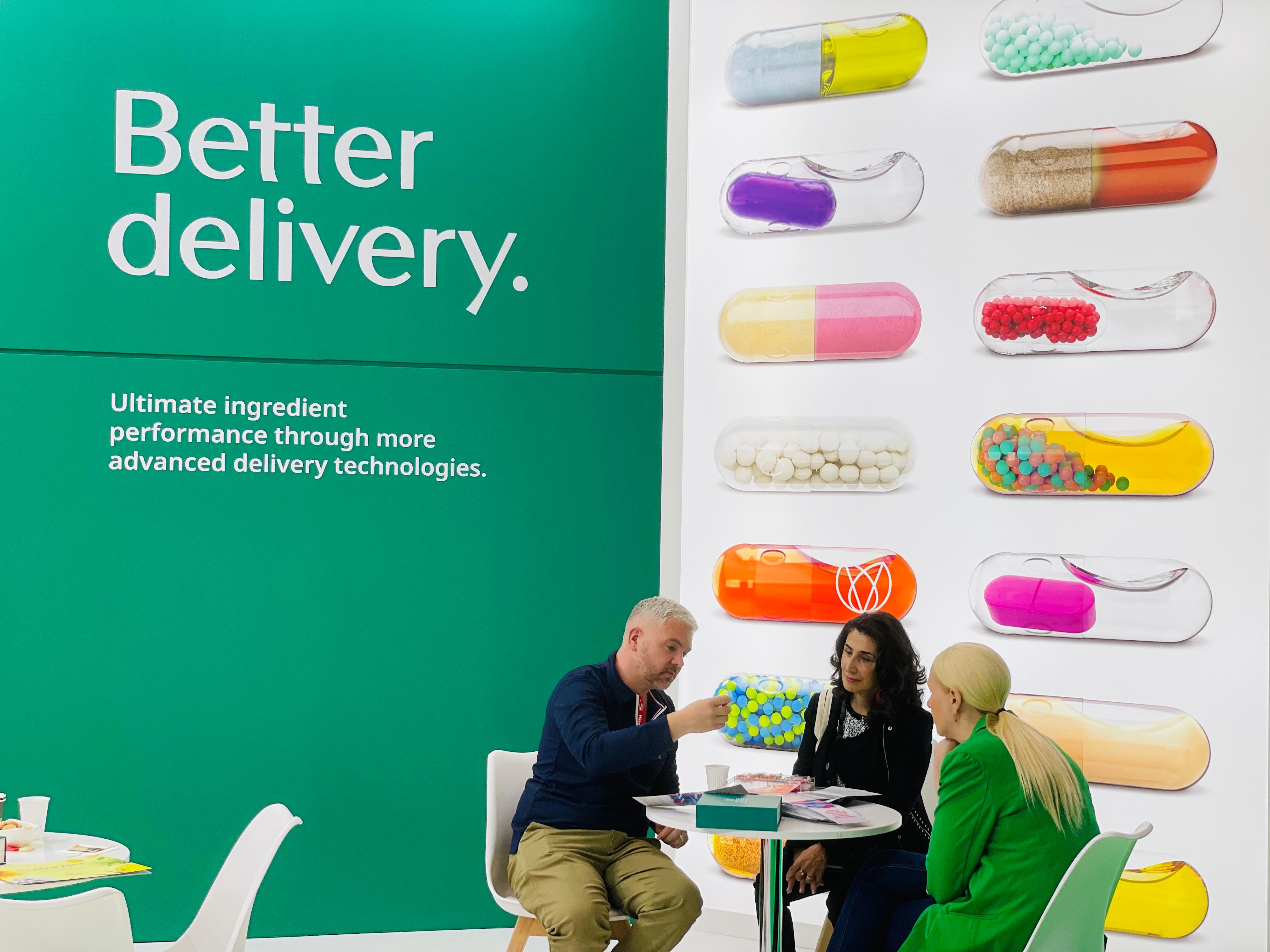
Vantage Nutrition to champion ‘better delivery’ at Vitafoods Europe 2024
At this year’s Vitafoods Europe, Vantage Nutrition (an ACG group company), will be showcasing and championing the term ‘better delivery’. With a real focus on innovation, the team will be debuting the outstanding beadlet technology, a complete product offering ultimate ingredient performance.Other ACG Capsules products on show will include ACGcaps™ H+, the world's first independently certified* ‘Clean Label' eco-friendly capsule, which is made using thermogelation technology (water and cellulose only). Alongside will be the ACGcaps™ TSafe opaque and TiO2-free clean capsules, with the enhanced version offering flexibility with pigmentation options.Aaron Quinn, head of business development at Vantage Nutrition – Europe, commented: “We know that the world’s healthiest products demand the world’s cleanest capsules performance through more advanced technologies. Through our innovations, we are committed to supporting nutraceutical brands when it comes to time consuming and costly R&D.“With the development of beadlet technology we are able to offer ultimate ingredient performance and enhanced delivery. Beadlets release ingredients over time, boost absorption and improve bioavailability. And by working with one supplier, manufacturers can ensure they have full control over all processes, with the 360 service – ensuring better results and enhanced uptake.”ACG is the world’s largest integrated supplier of pharmaceutical and nutraceutical solid dosage products and services. Along with the commitment to delivering integrated solutions and cutting-edge technology, Vantage Nutrition aims to provide the most comprehensive and advanced multiphase solutions to customers globally. The team’s focus in on turning product ideas into reality fast – helping companies enable, enhance, and differentiate nutra brands - from a full-service partnership to specific value additions.ACG will be exhibiting on stand H37, between 14-16 May in Geneva.* Certifications are applicable to certain colours and/or variants.About ACG For over 60 plus years, ACG has been innovating the production solutions for pharmaceutical and nutraceutical companies, that help make people better.As the world’s most integrated provider of oral dosage products and services, we produce capsules, barrier packaging materials, manufacturing machinery, and visual inspection and traceability solutions. All fully compliant with international standards.Today, ACG fosters long-term collaborative partnerships with customers in 138 countries across six continents.Together, we share a common purpose: to solve the world’s greatest health challenges and make it better for everybody we serve. For more information, please contact the ACG media relations team:madhurima.chakraborty@acg-world.com
Read more
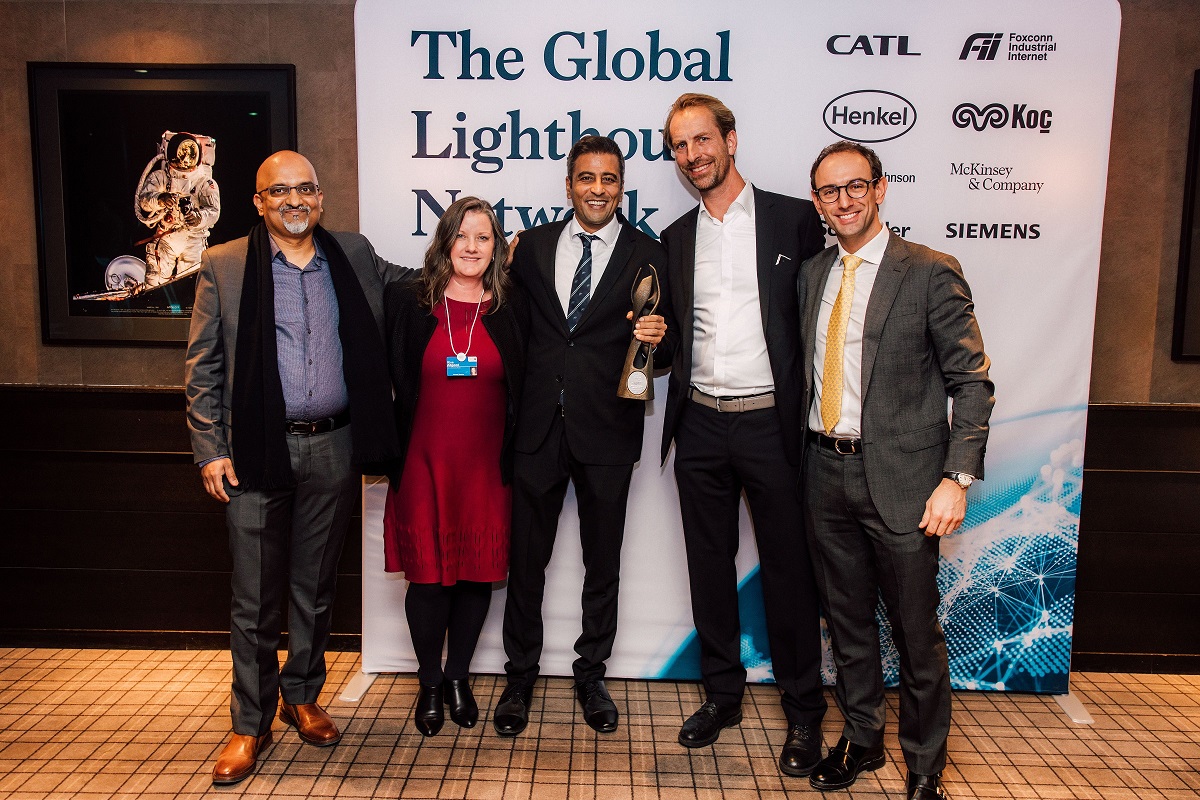
ACG Becomes the World’s First Capsule Manufacturing Factory to Join the Global Lighthouse Network Community 2023-24
ACG Capsules Pithampur, India is ACG’s 1st lighthouse to join the community Karan Singh, Managing Director and Balajikasiram Sundararajan, Chief Digital Officer attend the Global Light House Network ceremony in Davos to collect the award. ACG, the world's largest integrated supplier and service provider to pharmaceutical industry celebrated the inclusion of its capsule manufacturing facility in Pithampur, India, into the esteemed Global Lighthouse Network (GLN) by the World Economic Forum at the 54th Annual Davos Summit. The World Economic Forum’s Global Lighthouse Network has acknowledged the exemplary integration of Fourth Industrial Revolution (4IR) technologies, including artificial intelligence and big data analytics, by select factories globally. These facilities have been distinguished for their commitment to enhancing efficiency, fostering sustainable development, and simultaneously advancing their workforce’s skills and safeguarding the environment.Upon receiving the award, Mr. Karan Singh, Managing Director, said: “I am delighted to receive this recognition on behalf of my team. For me the most unforgettable part of our journey wasn't any technology or efficiency milestone, but the incredible team that made it all possible. Just ordinary people, united towards one goal, bringing about innovative collaborations to push boundaries of what is possible.” He added: “One of the stand-out features of our application was the Gen-AI integration. Something that was done in the less than two weeks. In between all the debate on what Gen-AI can do to humans it is a beautiful reminder that ‘technology is brilliant, but humans drive the change’. Let's remember that!”ACG operates across 138 countries in six continents and has positioned itself as a leader in the pharmaceutical sector by focusing on high-quality capsule production, increasing responsiveness, improving production yields, and boosting workforce efficiency. The company produces billions of capsules annually and has implemented over 25 innovative applications of 4IR technologies, including the industrial internet of things (IIoT), machine learning (ML), deep learning (DL), digital twins, extended reality, and generative AI.Selwyn Noronha, CEO, ACG Capsules, added: “We are extremely proud of our first factory lighthouse. From its inception the facility has pioneered in its field, but this latest honour recognises the excellence in adopting AI at speed and scale.“Our continued future-focused approach sets new benchmarks in quality and innovation, with the aim of ensuring maximum benefit for customers, regulators and the entire pharmaceutical ecosystem.”About Global Lighthouse Network Global Lighthouse Network is a collaborative platform bringing together forward-thinking manufacturers leading the charge in adopting Fourth Industrial Revolution technologies. Leveraging innovations like artificial intelligence, 3D-printing, and big data analytics, Lighthouses drive efficiency, competitiveness, and transformative business models at scale, fostering economic growth while championing workforce augmentation, environmental protection and providing a collaborative learning journey for all-sized manufacturers globally. The Global Lighthouse Network is a World Economic Forum initiative co-founded with McKinsey & Company and counselled by an Advisory Board of industry leaders, including Contemporary Amperex Technology (CATL), Foxconn Industrial Internet, Henkel, Johnson & Johnson, Koç Holdings, Schneider Electric, and Siemens. Factories and value chains that join the network are designated by an independent panel of experts.About ACG For over 60 plus years, ACG has been innovating the production solutions for pharmaceutical and nutraceutical companies, that help make people better. As the world’s most integrated provider of oral dosage products and services, we produce capsules, barrier packaging materials, manufacturing machinery, and visual inspection and traceability solutions. All fully compliant with international standards. Today, ACG fosters long-term collaborative partnerships with customers in 138 countries across six continents. Together, we share a common purpose: to solve the world’s greatest health challenges and make it better for everybody we serve.For more information, please contact the ACG media relations team:madhurima.chakraborty@acg-world.com
Read more
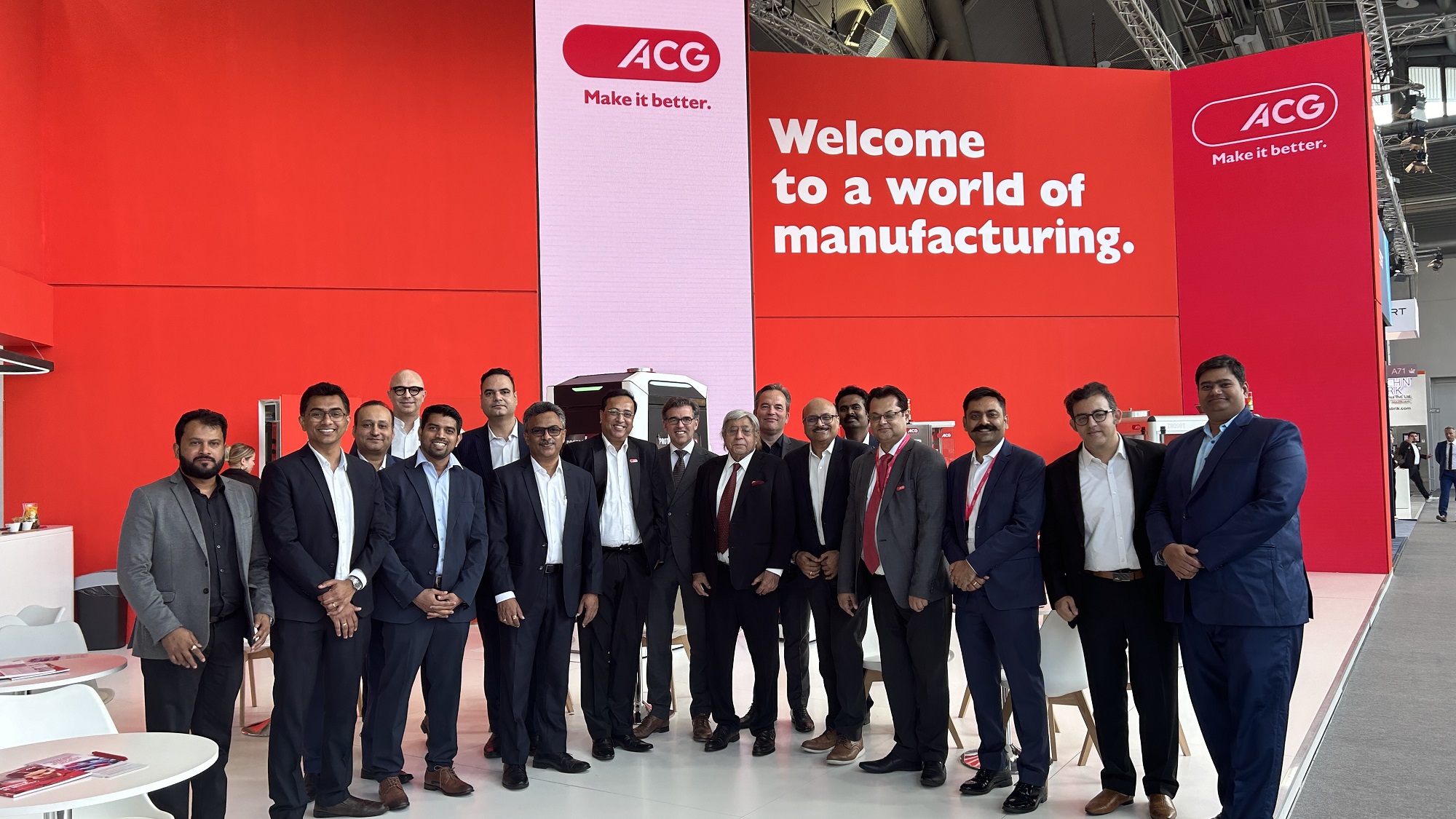
ACHEMA 2024: ACG Engineering on a mission to collectively ‘Make it Better’ World’s largest integrated supplier to the solid dosage manufacturing industry to display wide range of engineering and capsules products
At ACHEMA 2024 ACG Engineering, which provides end-to-end pharmaceutical engineering solutions,will be displaying its broadest range of products to date – underlining its commitment to ‘Making it Better’ for the industry and patients alike.The all-encompassing machines displayed will include the QUEST FB I, which is a highly versatile 'plug and play' fluid-bed unit for lab-scale feasibility studies. Also on show will be the ZRO 90T - a high-yield capsule filler. As will be the ACCURA 100FF - ACG's precision capsule checkweigher, suited for medium to large production batches with a capacity of 100,000 capsules per hour. Also on display will be the PROTAB 300 – a single rotary tablet press, which is suitable for R&D, small and medium-batch production, making scalability far easier, and the SECURECOAT TC III tablet coater, designed with operator safety and for use with highly potent active pharmaceutical ingredients (HPAPIs).Borja Guerra, vice president of international sales at ACG Engineering, said: “At ACG, we deliver efficient cutting-edge technology and a highly consistent ROI ratio for our global customer base, because we actively listen to them and their needs and take a collective approach towards ‘Making it Better’.“By aligning our shared strength and cross-divisional synergies with our Capsule and Films and Foils business units we are able to offer a whole world of different and highly targeted products and services – supporting large pharmaceutical companies and generic manufacturers with equal focus.”“We are really looking forward to ACHEMA 20024 and meeting with the industry to share knowledge and insights and to hopefully forge some new and exciting partnerships, continuing the expansion of ACG’s global footprint.”ACG will be exhibiting on stand A71 in Hall 3.1, between 10-14 June in Frankfurt.-Ends-About ACG For over 60 plus years, ACG has been innovating the production solutions for pharmaceutical and nutraceutical companies, that help make people better.As the world’s most integrated provider of oral dosage products and services, we produce capsules, barrier packaging materials, manufacturing machinery, and visual inspection and traceability solutions. All fully compliant with international standards.Today, ACG fosters long-term collaborative partnerships with customers in 138 countries across six continents.Together, we share a common purpose: to solve the world’s greatest health challenges and make it better for everybody we serve. For more information, please contact the ACG media relations team:madhurima.chakraborty@acg-world.com
Read more
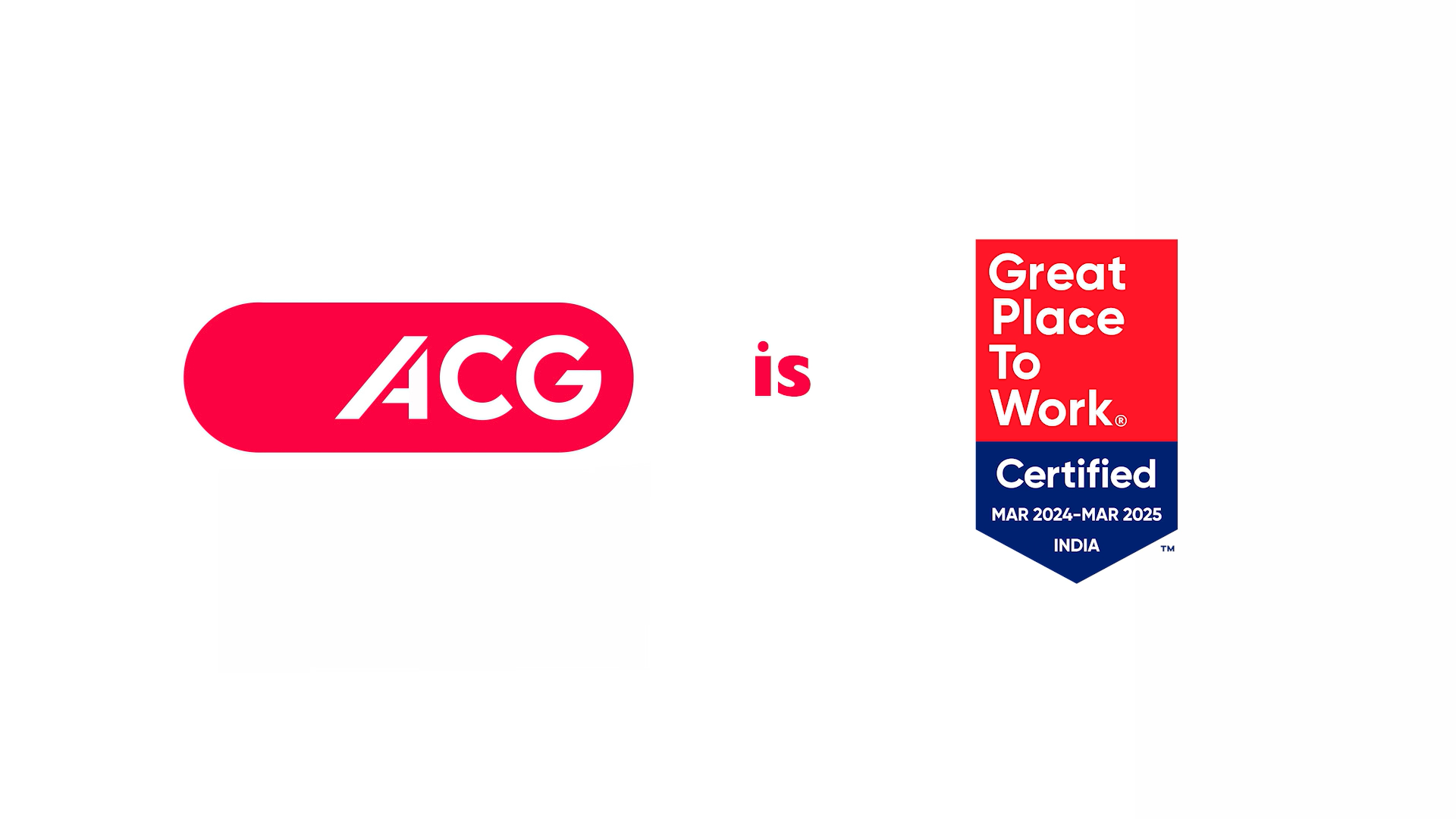
ACG awarded ‘Great Place To Work’ certification for a fourth consecutive year
ACG, the world’s largest integrated supplier and service provider to the pharmaceutical industry, is delighted to announce that for the fourth consecutive year, it has achieved the ‘Great Place To Work’ certification. This certification recognises employers who create an outstanding employee experience.Within ACG, five business units (Capsules, Corporate, Scitech – Research and Development Centre, Machinery, and Inspection), have been certified as a ‘Great Place to Work’. The comprehensive study, spanning five locations in India, encompassed approximately 3000 associates across management and plant categories. The process entailed a thorough survey based on key levers that define an organization's culture.Nikita Panchal, Group Head Talent, OD and DEI at ACG, said: “Winning this award for the fourth consecutive year fills me with pride and gratitude, recognizing the collective effort of our associates. It serves as a reminder of our commitment to excellence and the fact that institution-building is at the centre of all our actions as an organization.“ACG fosters collaboration by nurturing teamwork and effective communication. We care for our associates and the business community through support initiatives, and we remain progressive by supporting change and innovation. Our associates are encouraged to embrace our values, seize opportunities for growth and contribute their unique talents to shape a bright future together.”Sunil Jha, Group CHRO of ACG Group, added: “ACG thrives on collaboration through cross-functional teamwork, and – at all times – we prioritize the wellbeing of our associates.“Winning this award is incredibly gratifying and I am appreciative that all our associates have worked together to make this happen.”-Ends-About ACGFor over sixty years, ACG has been innovating the production solutions for pharmaceutical and nutraceutical companies, that help make people better. As the world’s most integrated provider of oral dosage products and services, we produce capsules, barrier packaging materials, manufacturing machinery, and visual inspection and traceability solutions. All fully compliant with international standards.Today, ACG fosters long-term collaborative partnerships with customers in 138 countries across six continents. Together, we share a common purpose: to solve the world’s greatest health challenges and make it better for everybody we serve. For more information, please contact the ACG media relations team:madhurima.chakraborty@acg-world.com
Read more
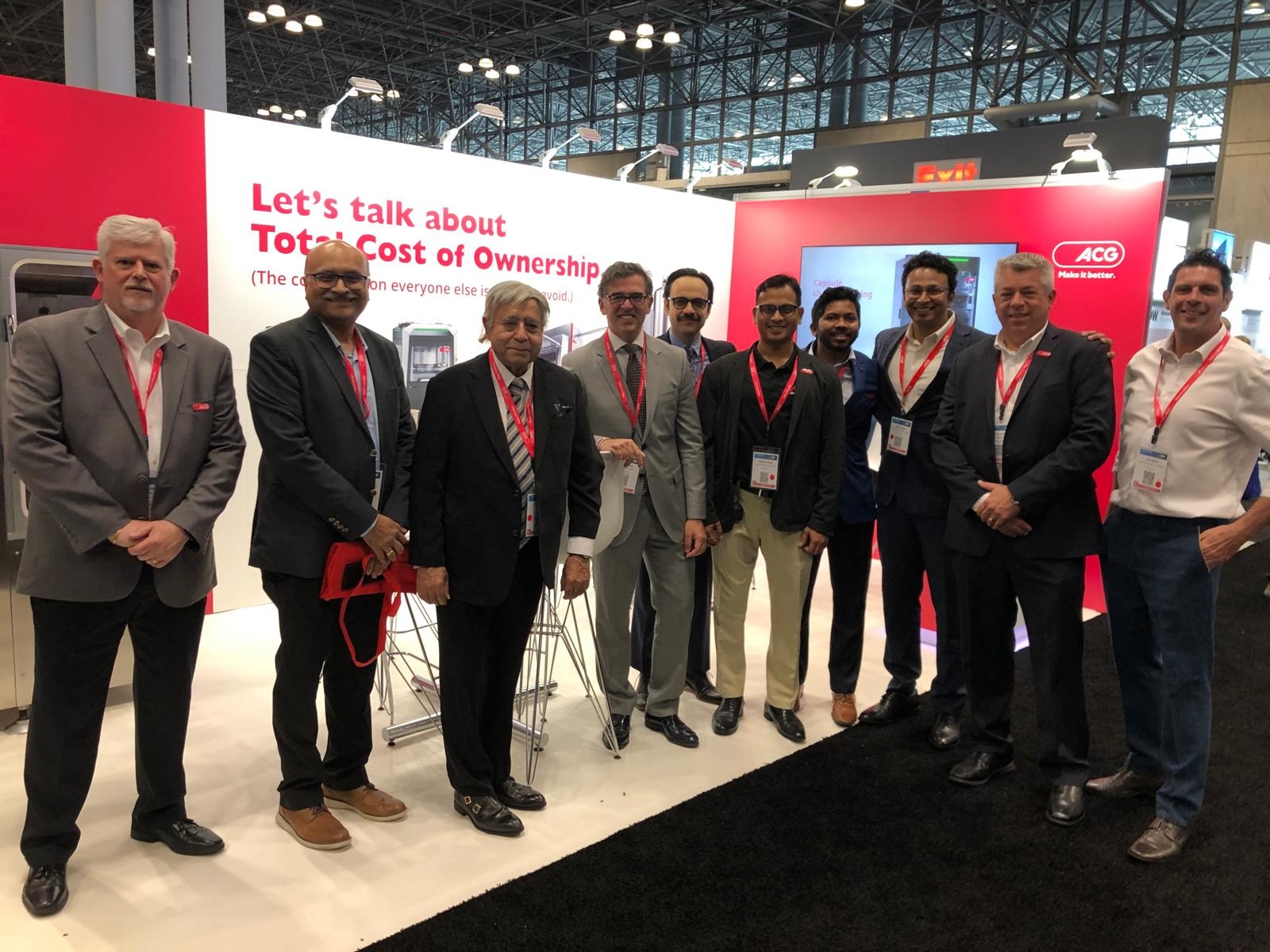
Interphex 2024: ‘ACG focuses on lowering manufacturer’s TCO’
At this year’s Interphex, ACG Engineering, part of ACG - the world's only integrated pharmaceutical solutions and manufacturing company - will be focusing on its cost-effective approach to taking generics to market.ACG’s methodology is based on speed-to-market, production efficiency and reducing manufacturing costs.Borja Guerra, vice-president of international sales at ACG, said: “As a highly experienced global supplier of process and packaging machinery of all oral solid dosage requirements, we are attuned to local market requirements. We aim to provide a low TCO (total cost of ownership) for premium pharmaceutical equipment.“With over six decades of experience partnering in the oral solid dosage space, we have taken over 8000 generics to market, working with more than 1000 pharmaceutical manufacturers to achieve this.”ACG will be showcasing its ACCURA 100 FF. The capsule checkweigher is designed specifically for precise, automatic, and continuous weighing of each capsule – whether empty, filled or partially filled, with anything from powder to pellets, and which is format free.ACG is the world’s largest integrated supplier of pharmaceutical and nutraceutical solid dosage products and services. The company will be exhibiting on stand 3515 between 16-18 April in New York.About ACG For over 60 plus years, ACG has been innovating the production solutions for pharmaceutical and nutraceutical companies, that help make people better.As the world’s most integrated provider of oral dosage products and services, we produce capsules, barrier packaging materials, manufacturing machinery, and visual inspection and traceability solutions. All fully compliant with international standards.Today, ACG fosters long-term collaborative partnerships with customers in 138 countries across six continents.Together, we share a common purpose: to solve the world’s greatest health challenges and make it better for everybody we serve. For more information, please contact the ACG media relations team:madhurima.chakraborty@acg-world.com
Read more
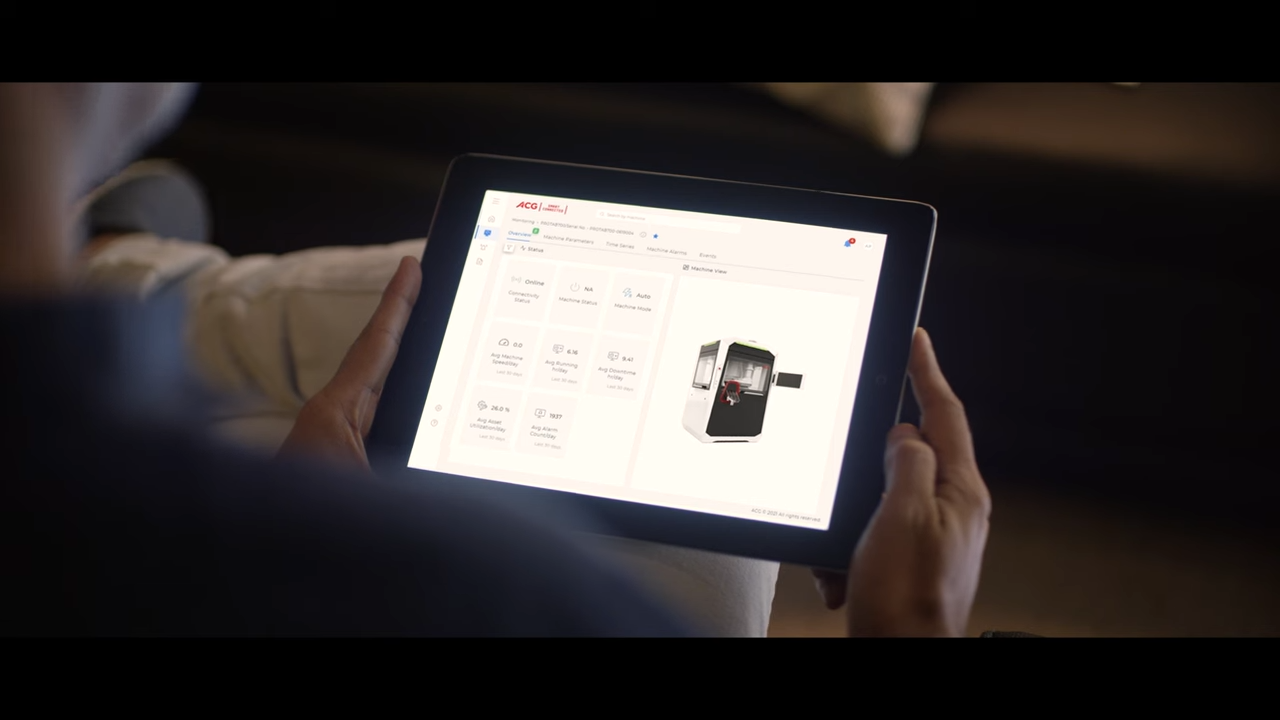
ACG Inspection launches new cloud-based offering to address upcoming VRS requirements under DSCSA regulations
In light of the impending Drug Supply Chain Security Act (DSCSA) regulations, ACG Inspection, a leading track and trace solutions provider for the pharmaceutical industry, has launched its new cloud-based Verification Router Service (VRS).The new system, which forms part of the ACG’s Inspections Life Sciences Cloud Service and Compliance Gateway, enables the automatic verification of saleable returns through product identifiers by routing requests and responses between stakeholders. Serialized products are assigned a unique identifier that can be used to track the product throughout its entire journey, enabling wholesalers to verify the authenticity of the products before they are resold.Shine Vijayan, CTO at ACG, commented: “The regulations, which have now been delayed by 12 months (coming into force in November 2024), will require all trading partners in the pharmaceutical supply chain to verify the identifier of any serialized drug product before redistributing it.“ACG’s existing VeriShield solutions tackles the implementation and interoperability challenges faced at Level 1, through to Level 3. With DSCSA’s regulation in place, ACG’s VRS covers level 4 - helping pharmaceutical manufacturers, distributors and retailers easily track and verify the saleable returns and secure their supply chain from counterfeit and substandard products.“ACG works closely with its customers, helping to address their pain points - one of which being concerns around data security. Our VRS employs robust security measures to safeguard serialized product information, guaranteeing the confidentiality and integrity of sensitive data throughout the verification process.”The system also guarantees real-time verification, to enhance operational efficiency and prevent supply chain delays. Additionally, it provides scalability assurance to accommodate an expanding volume of serialized data, to ensure continued robustness and reliability. And it incorporates exception handling, empowering stakeholders to address issues promptly to help maintain supply chain integrity.Shine Vijayan: “We are trusted experts and through our Life Sciences Cloud Service and Compliance Gateway, we can support counterfeit prevention, improving recall efficiency and data security. At all times, ensuring our clients are fully compliant with international standards and ready to meet the requirements as laid out in the impending DSCSA regulations.” -Ends- About ACGFor over sixty years, ACG has been innovating the production solutions for pharmaceutical and nutraceutical companies, that help make people better. As the world’s most integrated provider of oral dosage products and services, we produce capsules, barrier packaging materials, manufacturing machinery, and visual inspection and traceability solutions. All fully compliant with international standards.Today, ACG fosters long-term collaborative partnerships with customers in 138 countries across six continents. Together, we share a common purpose: to solve the world’s greatest health challenges and make it better for everybody we serve. For more information, please contact the ACG media relations team:madhurima.chakraborty@acg-world.com
Read more
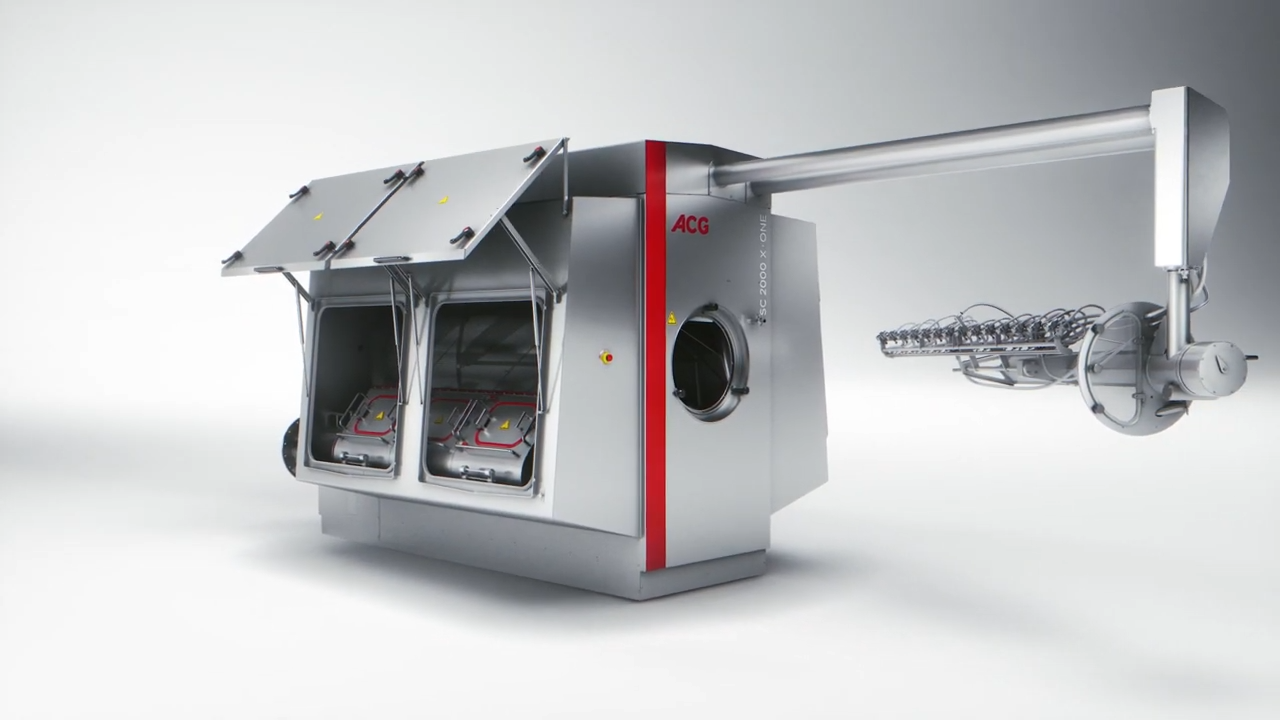
ACG Engineering launches the Smart Coater X.ONE Series Company’s fastest tablet coater ensures optimised production processes
ACG Engineering, a division of ACG, a leading supplier of integrated manufacturing solutions to the global pharmaceutical and nutraceutical industries, is delighted to launch its new Smart Coater X.ONE series, the company’s fastest tablet coater to date.The Smart Coater X.ONE has been designed to make tablet coating extremely fast, with an extra emphasis on process speed, efficiency and operator ease. Its advanced baffle design ensures the quickest process times for batches from 10-100%.Features of the new coater include a unique airflow pattern for optimized drying, a fully-perforated coating drum, closed dust-free charging, integrated discharge baffles, temperature sensor, a high-performing spray-arm and a 2.0 spray nozzle which has been developed with an anti-bearding cap. It also incorporates ACG’s exclusive X•ONE command and control system, designed to facilitate compliance with cGMP standards. Richard Stedman, CEO at ACG Engineering, said: “Our Smart Coater machines are already renowned for their innovative features and operator friendly designs. Now, after a lengthy period of development, we are excited to announce the launch of the X.ONE series.“Our quality-commitment philosophy means that the new machine has been crafted to achieve maximimum efficiency and flexibility for superior tablet coating, across every process – from charging to coating, discharging to cleaning. Each and every cycle is now swifter, more streamlined and profitable.“The fast tablet coater to date is already garnering real interest, and we look forward to continuing to showcase it capabilities at the upcoming CPhI event in Barcelona at the end of the month.” (XXX – may want to adapt this sentence, to reflect true accuracy)-Ends-About ACGFor over 60 years, ACG has been innovating the production solutions for pharmaceutical and nutraceutical companies, that help make people better.As the world’s most integrated provider of oral dosage products and services, we produce capsules, barrier packaging materials, manufacturing machinery, and visual inspection and traceability solutions. All fully compliant with international standards.Today, ACG fosters long-term collaborative partnerships with customers in 138 countries across six continents. Together, we share a common purpose: to solve the world’s greatest health challenges and make it better for everybody we serve.For more information, please contact the ACG media relations team:madhurima.chakraborty@acg-world.com
Read more
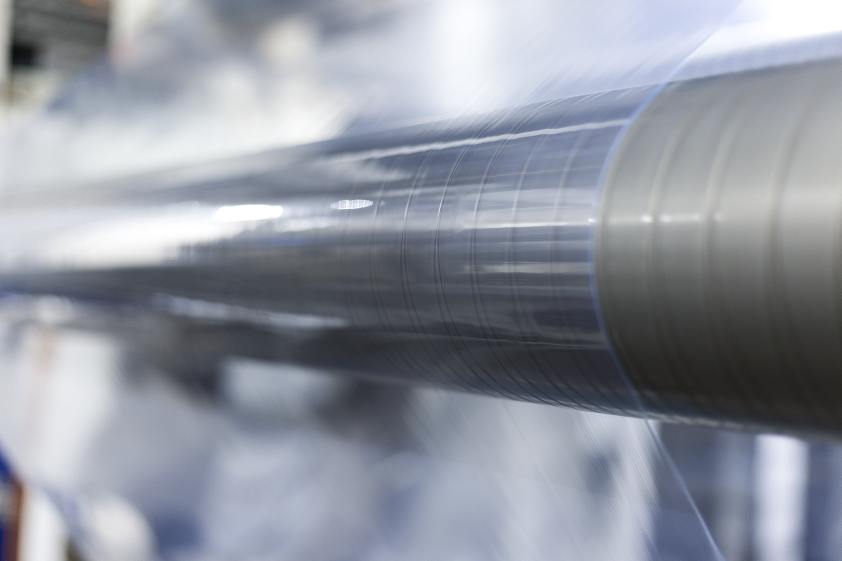
ACG acquires Technical Aluminium Foil Company
Further underpinning business growth across the Middle Eastern and African marketsACG announces full shareholding ownership of Technical Aluminium Foil Company (TAFC). This strategic move further solidifies ACG's growth trajectory across the Middle Eastern and African markets.As the world's only integrated pharma manufacturing solutions company, ACG offers a diverse range of products including capsules, films, foils, engineering equipment and inspection systems. The addition of TAFC, a prominent aluminium foil packaging company based in the UAE, strengthens ACG's position as a leading provider of comprehensive packaging solutions.TAFC boasts over a decade of experience serving the pharmaceutical and food industries with its extensive range of aluminium and specialty packaging foils renowned for their exceptional high barrier properties. The company's expertise in lacquering, lamination, printing and slitting further enhances ACG’s capabilities in meeting the diverse packaging needs of its clients.This acquisition represents ACG Group's inaugural venture in the Middle East, following recent successful acquisitions of ComboCap and AquaCap in the Americas. TAFC seamlessly aligns with ACG Films and Foils' existing business operations, enabling both entities to harness their collective strengths and expertise for accelerated growth.Shivshankar S.R., CEO at ACG Films & Foils, said: “We are excited to be making our first acquisition in the UAE. This strategic collaboration will further support our work in bringing innovative and high-quality packaging products to market, while reducing lead times and improving service levels.“By joining forces, the companies will be able to leverage their combined strengths and expertise to propel the business forward in the Middle Eastern and African markets.”-Ends-About ACGIn accordance with its commitment to making the world healthier, ACG has been delivering exceptional solutions to the global pharmaceutical and nutraceutical industry for sixty years, across six continents and in a hundred countries.Collaboration is at the core of ACG’s ethos. ACG is the world’s only integrated pharma manufacturing solutions company, with products ranging from capsules to films & foils, to engineering equipment and inspection systems – all that meet international regulatory requirements. For ACG, it’s always about finding innovative solutions to the world’s greatest health challenges, together.For more information, please contact the ACG media relations team:madhurima.chakraborty@acg-world.com
Read more
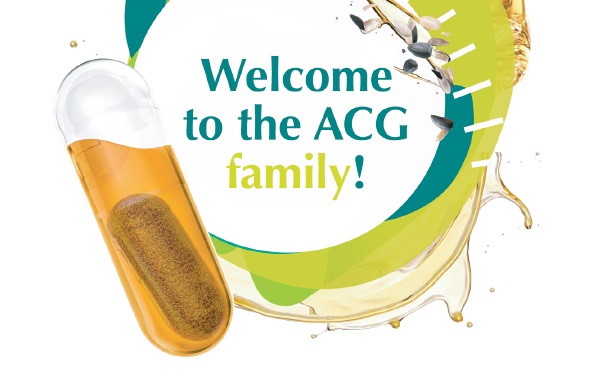
Vantage Nutrition LLC acquires ComboCap Inc
This acquisition positions Vantage Nutrition as the only company in the world supplying Sidebysideä health products to nutritional and pharmaceutical markets, for enhanced combinations.Vantage Nutrition, an ACG group company announces full shareholding ownership of ComboCap Inc (USA) and BioCap (South Africa).ComboCap is renowned for the invention and commercialization of its Sidebyside technology, the world’s first three-piece capsule health product that contains an internal divider, enabling wet and dry ingredients to be brought to market side by side, separated-but-together. Backed by 80 international patent awards ComboCap has been supplying nutritional brand customers with unique finished product solutions out of its cutting-edge cGMP plant in NJ, USA. This acquisition marks a significant milestone for Vantage Nutrition and ACG, as it further expands its technology and customer solutions footprint in North America and around the world.ACG is the world’s largest integrated supplier of pharmaceutical and nutraceutical solid dosage products and services. Vantage Nutrition, an ACG group company, already has an excellent reputation as an innovator of liquid filled capsule solutions. ComboCap marks Vantage Nutrition’s second US investment in less than a year, and first in S.A, after Philadelphia-based ‘AquaCap’ was acquired from Nestlé S.A. With this expansion of manufacturing capabilities and patented technology, along with the commitment to delivering integrated solutions and cutting-edge technology, Vantage Nutrition aims to provide the most comprehensive and advanced multiphase solutions to customers globally.Karan Singh, Managing Director at ACG, said, "As one of world’s largest producers of empty hard-shell capsules, at ACG we have often thought, what next? Strengthening our portfolio of most comprehensive vegetarian and gelatin capsules, in every imaginable size, I am thrilled to announce the acquisition of ComboCap Inc and BioCap. We now will hold the patented design and specialized equipment used inproducing the world’s first 2-in-1 capsule product with a movable membrane, becoming the sole proprietor of this technology globally.With our partners, we will usher a new era in new combinations of dietary supplements, and even non-prescription or over-the counter (OTC) remedies as well as prescription (Rx) medicines to be delivered in a single dose. This technological breakthrough is a solution to current formulation challenges with many combination therapies, including incompatible ingredients or molecules. Capsules are arguably the safest and most reliable way to deliver medicine and we at ACG strive to make it better.”Tobie Louw, a Founder and CEO of ComboCap Inc, said: “Vantage Nutrition is the perfect partner for our business, and we are very excited to be part of the ACG family. We share a passion for innovation and the commitment to bring nutraceutical and pharmaceutical customers the best possible solutions and services. By joining forces and leveraging our collective capabilities we’ll no doubt bring Sidebysideä to nutraceutical and pharmaceutical markets the world over.”-Ends-About Vantage NutritionVantage Nutrition, part of the ACG Group, is one of the world’s largest and most respected manufacturer of hard-shell liquid-fill capsule solutions. As a strategic consultancy and manufacturing partner in the nutraceutical space, Vantage Nutrition helps clients bring high-quality and innovative products to market, fast. About ACGIn accordance with its commitment to making the world healthier, ACG has been delivering exceptional solutions to the global pharmaceutical and nutraceutical industry for sixty years, across six continents and in a hundred countries.Collaboration is at the core of ACG’s ethos. ACG is the world’s only integrated pharma manufacturing solutions company, with products ranging from capsules to films & foils, to engineering equipment and inspection systems – all that meet international regulatory requirements. For ACG, it’s always about finding innovative solutions to the world’s greatest health challenges, together.For more information, please contact the ACG media relations team:madhurima.chakraborty@acg-world.com
Read more
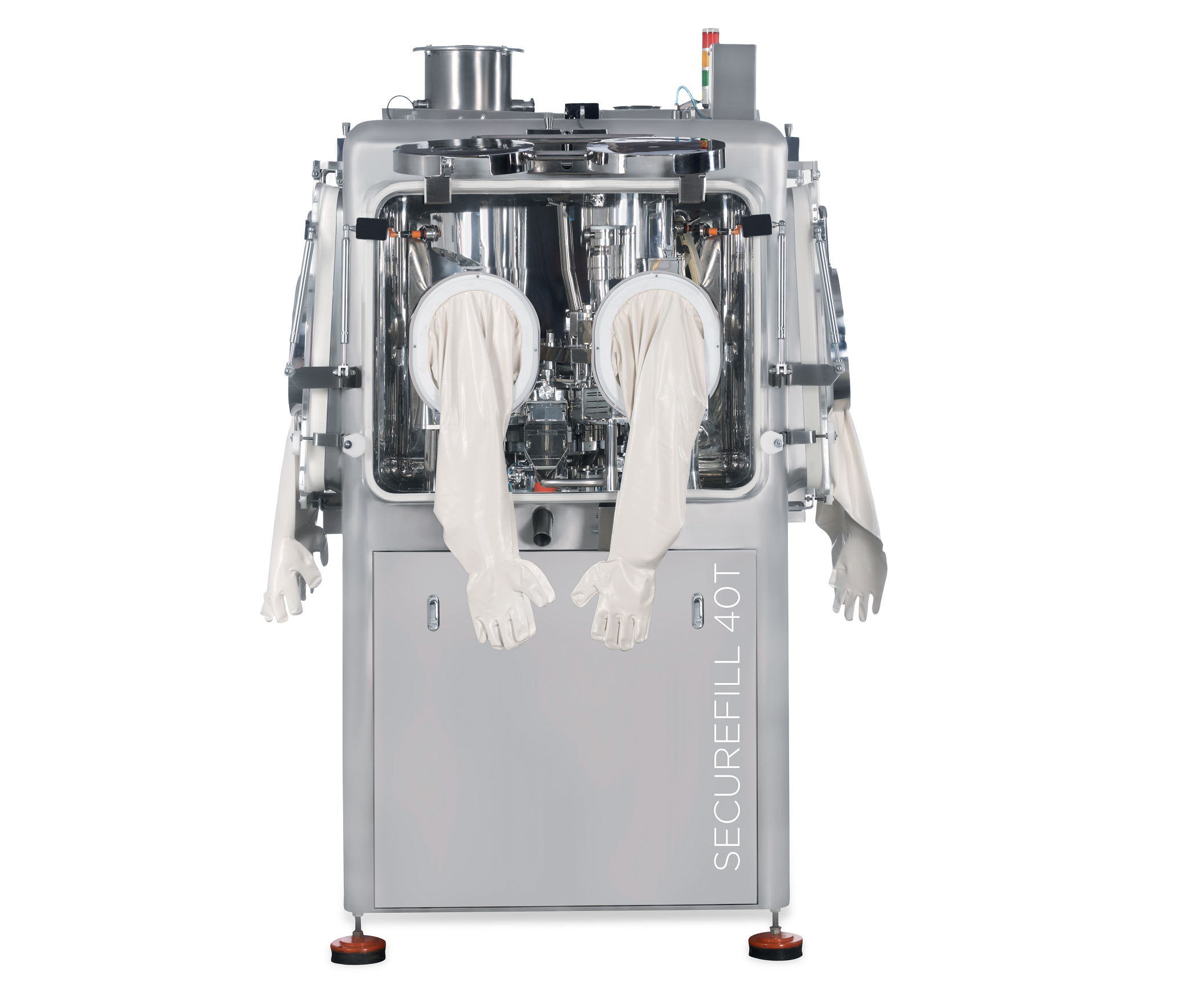
ACG Engineering – SECUREFILL 40T
Tablets & CapsulesCapsule Filling Equipment & Supplies (February 2023)ACG Engineering – SECUREFILL 40TThe Securefill series is ACG’s high-level containment capsule-filling machine range. Designed for filling capsules with highly potent and/or toxic drugs, the machines comply with occupational exposure band (OEB) up to level 4.Built with operator safety in mind, these machines are equipped for filling capsules with oncological, biopharmaceutical, antiviral formulations, and other such highly potent active pharmaceutical ingredients (HPAPIs).Features:• SS316L monoblock structure containing HEPA filters, a rapid transfer port (RTP), glove ports, and accurate dosing mechanisms maintained in a negative pressure environment.• Provision for contained charging and discharging.• Wet-in-place system to ensure wetting of all suspended particles in the pharma zone.• Can be integrated with check-weighers, metal detectors and de-dusters under containment conditions.Benefits:• Ensures complete containment, thereby avoiding operator contact within OEL range 1-10µg/m3.• Integrated containment philosophy for upstream and downstream processes.• Enables easy cleaning.• Supports the production of life-saving drugs that contain HPAPIs.Technical specifications: SECUREFILL 40T Capsule size 00 - 5 Maximum speed 40,000 capsules/hour OEL 1-10µg/m3About ACGIn accordance with its commitment to making the world healthier, ACG has been delivering exceptional solutions to the global pharmaceutical and nutraceutical industry for sixty years, across six continents and in a hundred countries.Collaboration is at the core of ACG’s ethos. ACG is the world’s only integrated pharma manufacturing solutions company, with products ranging from capsules to films & foils, to engineering equipment and inspection systems – all that meet international regulatory requirements. For ACG, it’s always about finding innovative solutions to the world’s greatest health challenges, together.For more information, please contact the ACG media relations team:madhurima.chakraborty@acg-world.com
Read more
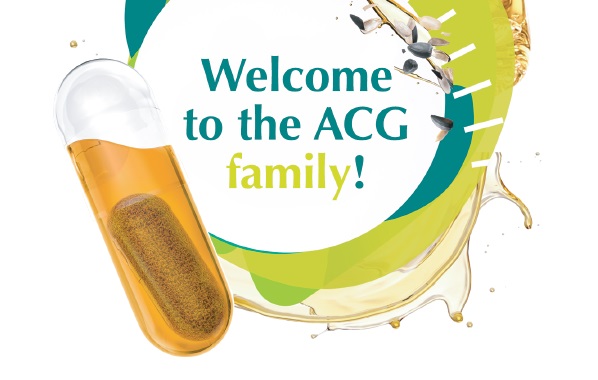
Vantage Nutrition LLC acquires Aquacaps from Nestlé Health Science
Vantage Nutrition’s innovative nutraceutical offering expands into North America.. Vantage Nutrition, an ACG Group company, announced on 1st December 2022 that it has acquired Philadelphia-based ‘Aquacaps’ – an asset of Nestlé Health Science. Aquacaps is a leading contract manufacturer of liquid-filled capsules within the nutritional supplement industry in the United States. Its novel liquid delivery technology allows for the liquid filling of hard gelatin and vegetarian capsules. ACG is the world’s largest integrated supplier of pharmaceutical and nutraceutical products and services. Vantage Nutrition, an ACG group company, already has an excellent reputation as an innovator of two-piece liquid fill capsule solutions. The company’s mission is to be the most efficient partner in delivering innovative and high-quality nutraceutical products to customers globally. Karan Singh, Managing Director of ACG, said: “Although ACG has been established in North America for the last 20 years, this marks our first acquisition in the territory and is a key next step in our global expansion strategy. With this increase in our footprint and manufacturing capabilities, coupled with Vantage’s innovative technologies and 360-degree service offering, we aim to provide the most advanced combination liquid-fill solutions for customers across the region.” About VantageVantage Nutrition, part of the ACG Group, is one of the world’s largest and most respected manufacturer of hard-shell liquid-fill capsule solutions. As a strategic consultancy and manufacturing partner in the nutraceutical space, Vantage helps clients bring high-quality and innovative products to market, fast. About ACGIn accordance with its commitment to making the world healthier, ACG has been delivering exceptional solutions to the global pharmaceutical and nutraceutical industry for sixty years, across six continents and in a hundred countries.Collaboration is at the core of ACG’s ethos. ACG is the world’s only integrated pharma manufacturing solutions company, with products ranging from capsules to films & foils, to engineering equipment and inspection systems – all that meet international regulatory requirements. For ACG, it’s always about finding innovative solutions to the world’s greatest health challenges, together.For more information, please contact the ACG media relations team:madhurima.chakraborty@acg-world.com
Read more
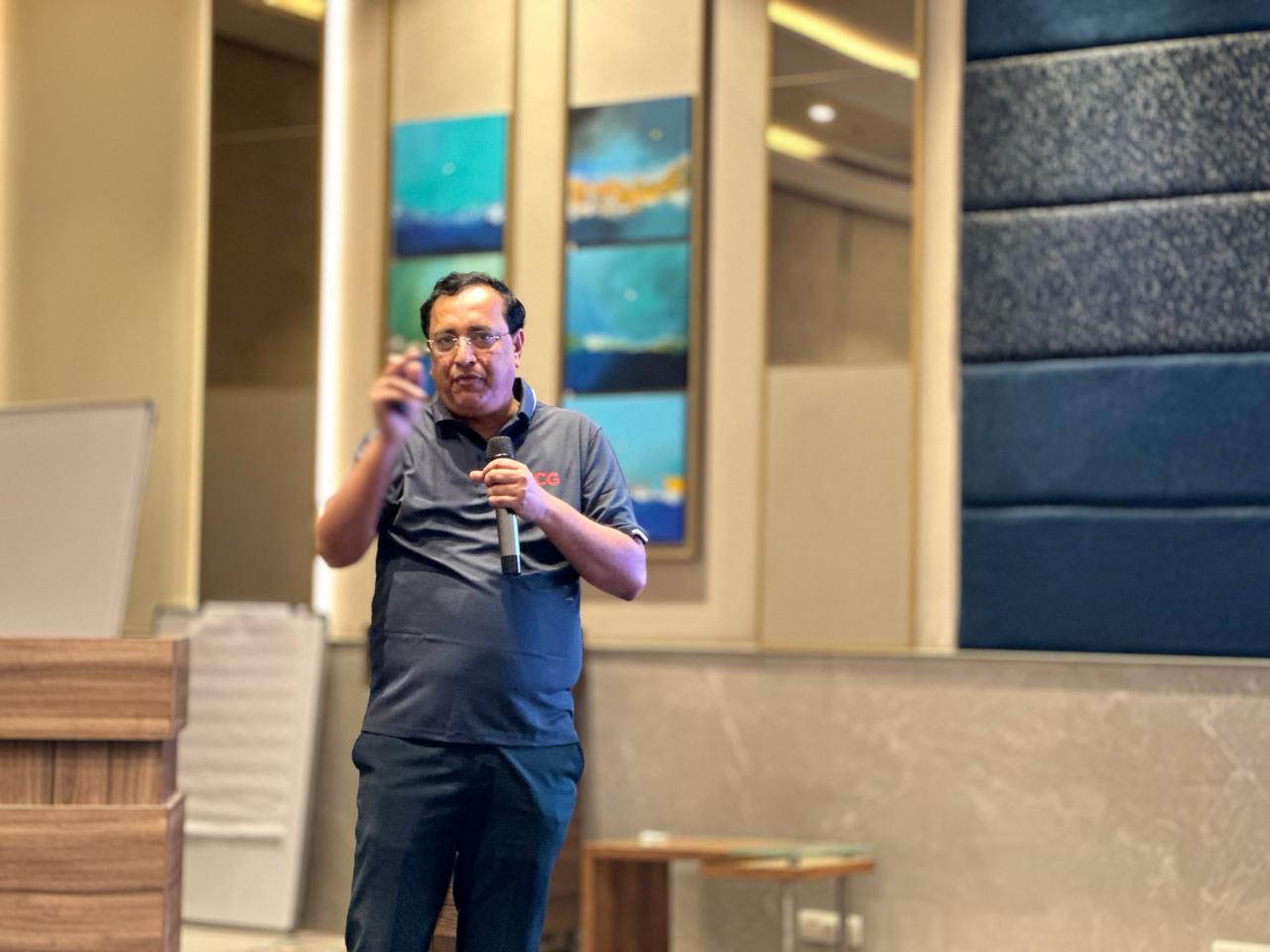
ACG appoints Shankar Gupta as Chief Sales Officer Industry authority to re-join business in a newly created role
ACG, the world’s largest integrated pharmaceutical and nutraceutical manufacturing solutions provider, is delighted to announce that Shankar Gupta will be re-joining the business in the newly created role of Chief Sales Officer.In his new role, Shankar will be responsible for driving sales across all four ACG divisions (Films and Foils, Capsules, Inspection and Engineering) in order to continue building the company’s ‘One ACG’ agenda. Essentially, this will involve bringing further uniformity to ACG's customer outreach processes, creating more integrated solutions, and ultimately providing a consistent brand experience to ACG’s global customers, regardless of business division or location. He will also focus on scaling new initiatives.Shankar will report directly into the managing director, Karan Singh, who comments:"I am so pleased that Shankar Gupta has decided to rejoin the business during this exciting time. His understanding of ACG and its deliverables, and deep insight into our customers’ businesses will help us to align ourselves better to their changing needs. More importantly, he will champion and support better collaboration and partnership with customers.“Shankar will be pivotal in calibrating and aligning our business units to our goal of ‘Making it Better’, and our belief that everyone deserves access to good medicine."Shankar Gupta adds: “I am excited to use my experience in the pharmaceutical industry to augment ACG's growth by aligning the organisation to the changing dynamics of the global healthcare Industry.“It will certainly call for a huge collaboration of efforts both internally and with our customers, but will ultimately lead to a richer, deeper and more numerous partnerships.”-Ends-About ACGIn accordance with its commitment to making the world healthier, ACG has been delivering exceptional solutions to the global pharmaceutical and nutraceutical industry for sixty years, across six continents and in a hundred countries.Collaboration is at the core of ACG’s ethos. ACG is the world’s only integrated pharma manufacturing solutions company, with products ranging from capsules to films & foils, to engineering equipment and inspection systems – all that meet international regulatory requirements. For ACG, it’s always about finding innovative solutions to the world’s greatest health challenges, together.For more information, please contact the ACG media relations team:madhurima.chakraborty@acg-world.com
Read more
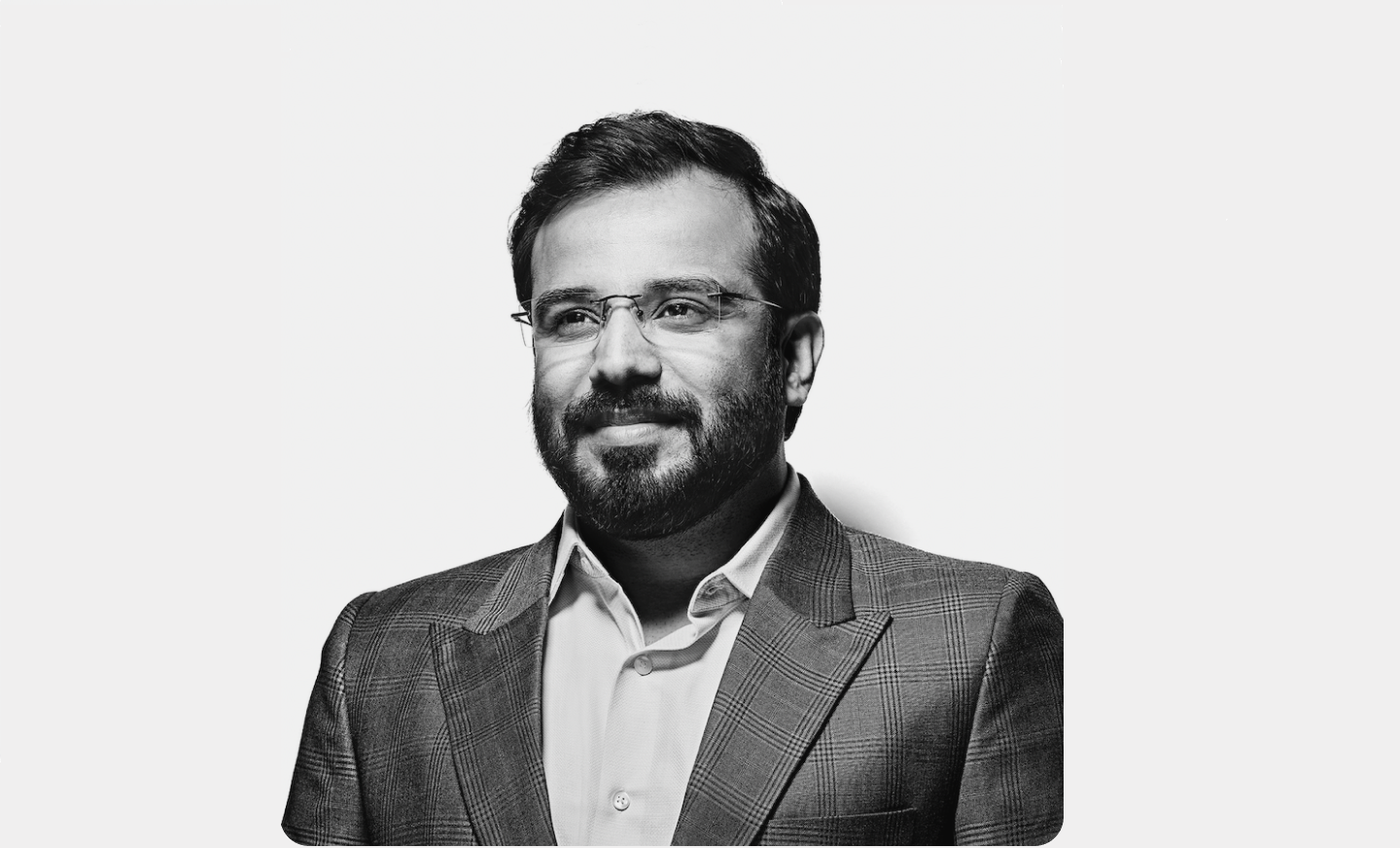
ACG appoints Udit K Singh as CEO of ACG Inspection
ACG, a leading supplier of fully integrated manufacturing solutions to the global pharmaceutical and nutraceutical industry, is pleased to announce the appointment of Mr. Udit K Singh as the new chief executive officer (CEO) of its Inspection Division.Mr. Singh will be supporting the company as it continues its growth and global expansion. He will be responsible for ensuring that every dose of medication that ACG Inspection’s pharmaceutical and nutraceutical partners provide is manufactured and delivered exactly as intended. That is down to the fact that ACG’s visual inspection systems track and monitor the manufacturing lines to guarantee flawless, safe products.Karan Singh, managing director, ACG said: “ACG is focused on building a diverse, world-class team by hiring top international talent. We are delighted to welcome Udit Singh to ACG Inspections. He has had an illustrious career and brings diverse and unique capabilities, including a robust understanding of the pharmaceutical sector.“The team looks forward to tapping into his deep experience to enrich our global work towards making the world safer and healthier. With his knowledge and expertise in this field, Udit Singh is sure to take ACG Inspection to newer heights.”Mr. Singh added, “I am pleased to join ACG and will work to ensure that our advanced serialisation, aggregation and anti-counterfeiting solutions track and protect medicines all the way through the supply chain, and into the hands of those who need them.“We are investing substantially to ensure our track and trace platform performs seamlessly and complies with regulatory requirements all over the world. I look forward to playing an integral role, and contributing towards the continued development, working with a world-class team.”About ACGIn accordance with its commitment to making the world healthier, ACG has been delivering exceptional solutions to the global pharmaceutical and nutraceutical industry for almost sixty years, across six continents and in a hundred countries.Collaboration is at the core of ACG’s ethos, and ACG is the world’s only integrated pharma manufacturing solutions company, with products ranging from capsules to films & foils, to engineering equipment and inspection systems – all that meet international regulatory requirements. For ACG, it’s always about finding innovative solutions to the world’s greatest health challenges, together.For more information, please contact the ACG media relations team:madhurima.chakraborty@acg-world.com
Read more
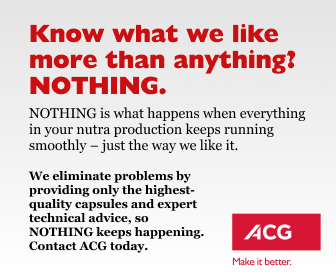
ACG Capsules launches campaign to promote problem-free pharmaceutical production
-One of the world’s largest producers of empty hard-shell capsules is on a mission to‘Love NOTHING’ when it comes to zero-problem productionACG, one of the world’s largest producers of empty hard-shell capsules, has launched its global pharmaceutical campaign: ‘ACG loves NOTHING’. The campaign is aimed at significantly improving pharmaceutical production through collaboration and industry-leading innovation. With a host of value-added services on offer, ACG has taken a pledge to strive for zero-problem pharmaceutical and nutraceutical manufacturing.Alex Robertson, CMO at ACG, said: “The messaging at the centre of this campaign is: ‘ACG loves NOTHING’ – we are putting every effort towards zero-problem production. That’s because when ‘nothing’ happens during pharmaceutical and nutraceutical production, everything runs reliably, and our customers can get the products they make to the people who need them. We will achieve this by providing the highest quality empty capsules and all the holistic advice and expertise required for seamless operations.”Founded 60 years ago, ACG was created on the simple principle of ‘Make it Better’. As the world’s largest integrated supplier of solid dosage pharmaceutical and nutraceutical products, and with the most comprehensive ranges of vegetarian and gelatin capsules globally, ACG has the scale and range to have a far-reaching impact on pharmaceutical production and human health.Selwyn Noronha, CEO ACG Capsules, added: “The pharmaceutical sector is regulated and highly competitive. Companies operating within it need a diverse range of quality capsules that help them stand out from the crowd, while also meeting demands for clean and natural products.“Beyond exceptional products, these companies need expertise and a lifetime of targeted support to ensure efficient manufacturing and guarantee regulatory compliance. With proficiency in all aspects of manufacturing from capsules to machines and protective barriers, for the last 60 years ACG has been the only company to offer this level of support, and it continues with this focus at the heart of operations.”So, at ACG, there really is something about NOTHING. The company is on a mission to drive towards problem free production and collaborating with its customers to collectively deliver on its mission of creating a healthier world.About ACGIn accordance with its commitment to making the world healthier, ACG has now been delivering exceptional solutions to the global pharmaceutical and nutraceutical industry for 60 years, across six continents and in 138 countries.‘Collaboration’ is at the core of ACG’s ethos, and ACG is the world’s only integrated pharma manufacturing solutions company, with products ranging from capsules to films & foils, to engineering equipment, and inspection systems – all that meet international regulatory requirements.For ACG, it’s always about finding innovative solutions to the world’s greatest health challenges, together.For more information, please contact the ACG media relations team:madhurima.chakraborty@acg-world.com
Read more

Q&A: ACG expands in Croatia - ACG speaks exclusively to European Pharmaceutical…
Q&A: ACG expands in Croatia - ACG speaks exclusively to European Pharmaceutical Manufacturer
1. With the expansion of capsule production capabilities at ACG's Croatian facility, how does this enhance the company's ability to meet global demand for oral solid dose capsules?The importance of increasing capacity at ACG's Croatian facilityACG's decision to expand its capsule manufacturing capacity at the Croatian facility comes at a critical time. This expansion is a consequence of our customer’s growing confidence in our supply from this plant and is designed to enhance the company's ability to meet the rising demand in Europe for high-quality empty hard capsules. By significantly increasing production capacity in Croatia, ACG is positioning itself as a reliable supplier to help mitigate supply chain disruptions and ensure a steady, high-quality supply of capsules for the pharmaceutical industry. This move not only strengthens ACG's position in the European market but is also an invitation to those customers who aspire to work with a progressive growing company that is investing and creating jobs locally in a region. ACG’s global expansion strategyRecognising that the Croatian facility alone cannot fully address the growing global need for empty hard capsules, ACG is taking proactive steps to expand its manufacturing capacity worldwide. The company is investing in facilities and production lines across multiple regions, ensuring that it can provide a reliable supply of capsules to markets around the globe. This expansion is critical to establishing a resilient, diversified supply chain that can withstand regional disruptions and provide pharmaceutical companies with the certainty they need to meet market demands.2. Is there a growing interest in advanced drug delivery systems?Multi-particulate formulations (MPFs) have garnered significant attention from product developers in recent years due to their superior benefits over traditional tablet formulations. These include improved drug release profiles, reduced risk of dose dumping, enhanced bioavailability, and flexibility in designing controlled release systems. As a result, MPFs are increasingly being adopted for advanced drug delivery systems, driving year-on-year growth in this area of pharmaceutical development.Since capsules are the ideal medium for encapsulating and delivering these multi-particulate formulations in a presentable and effective format, ACG plays a critical role in supporting the pharmaceutical industry’s transition to MPFs. The company recognises that providing the right empty hard capsules is essential to ensuring the success of these advanced drug delivery systems.To address this growing need, ACG is working closely with customers at the start of their development journey. By offering expert guidance on choosing the right capsule types, ACG helps prevent formulation failures later in the process, which could result in costly delays and wasted time. This proactive support ensures that pharmaceutical developers avoid making mistakes that could jeopardise their product’s success in the market.Furthermore, ACG is committed to creating awareness and educating its customers on the advancements in capsule manufacturing technologies, particularly the use of Hypromellose (HPMC)-based empty hard capsules as an alternative to traditional gelatine capsules. HPMC capsules offer distinct advantages, such as being vegetarian, suitable for a wider range of formulations, and offering better stability for certain active pharmaceutical ingredients (APIs). This shift towards HPMC capsules reflects the evolving demands of both regulatory requirements and consumer preferences for more versatile and sustainable options.By partnering with customers and providing them with the right tools and knowledge, ACG is not only supporting the growth of advanced drug delivery systems but also positioning itself as a key enabler for the pharmaceutical industry’s future success in this rapidly advancing field.3. How is ACG addressing the growing demand for patient-friendly dosage forms, such as easy-to-swallow capsules and personalised medicine?At ACG, our customer-centric mindset has enabled us to become an extremely flexible supplier, dedicated to meeting the evolving demands of the market, particularly in the development of patient-friendly dosage forms. We understand the importance of delivering medications in formats that are convenient, aesthetically appealing, and easy to use, which is why we continuously adapt our products to address these needs.Flexible sizes for ease of swallowingACG has proven its flexibility by offering capsules in a variety of sizes to ensure that drugs can be encapsulated in the smallest possible capsules, making them easier for patients to swallow. By offering a range of capsule sizes, ACG ensures that medications are delivered in a form that maximises patient compliance.Aesthetic and natural coloured capsulesACG is mindful of the aesthetic preferences of patients, and we have developed capsules in a variety of coloured combinations, including natural-coloured options. This is particularly important in overcoming the "pill effect"—a common issue where patients are reluctant to take medicines. Our natural-coloured capsules provide a more neutral, less intimidating appearance, enhancing patient acceptance.Easy-to-open capsules for swallowing difficultiesMany of our customers have proactively turned to regular capsules as an ideal solution for patients who have difficulty swallowing pills. These capsules can be opened, allowing patients to sprinkle the contents into food or beverages, making it more convenient for patients with swallowing difficulties to consume their medication without stress.Delayed-release capsules for specialised needsIn response to the growing demand for advanced drug delivery systems, ACG offers delayed-release capsules designed to protect sensitive ingredients like probiotics and enzymes. These capsules provide the necessary protection from the acidic environment of the stomach, ensuring that the active ingredients are delivered effectively to the areas where they are most needed in the digestive system.Unique capsule designs with anti-counterfeit featuresACG also offers innovative capsule designs such as Clinicaps and Tabsules. These capsules not only provide functional benefits but also include anti-counterfeit features, adding an extra layer of security for both patients and pharmaceutical manufacturers. These designs can be integrated into dosage forms to enhance brand protection and ensure that patients are receiving the correct medication.ConclusionBy staying true to its customer-centric philosophy, ACG has proven itself as a highly adaptable partner in addressing the growing demand for patient-friendly dosage forms. Our flexible approach allows us to meet the diverse needs of the healthcare industry, from offering capsules in various sizes and colours to providing advanced solutions like delayed-release colourscapsules and anti-counterfeit designs. This commitment to innovation ensures that we are well-positioned to help pharmaceutical companies deliver medications in formats that enhance patient compliance and overall treatment outcomes. Source: https://pharmaceuticalmanufacturer.media/pharmaceutical-industry-insights/pharmaceutical-manufacturing-insights/q-a-acg-expands-in-croatia/
Read more

ACG expands capsule production capabilities at its Croatian facility
ACG expands capsule production capabilities at its Croatian facility
ACG has expanded its European footprint with an upgrade to its Croatian facility.The extension of its existing site enhances its capsule shell manufacturing capacity, while also offering novel warehouse and slitting facilities.This will allow ACG to cater to the increasing demand amongst the pharmaceutical industry for capsule solutions, while also strengthening its European presence.It will also allow the company to streamline the region's supply chain.Since ACG acquired the capsule manufacturing site in Croatia, the compaby has invested more than €50m into the infrastructure and technology of the facility, while also focusing on process optimisation.This recent expansion — according to the company — will be completed by the end of 2024.CEO of ACG Capsules, Selwyn Noronha, commented: "The expansion of our Croatian facility marks a pivotal moment in our European strategy. By boosting production and logistics capabilities, we are not only improving lead times but also contributing to the local economy by creating new job opportunities.""This facility meets the highest global manufacturing standards, and we are replicating our sustainability initiatives here, ensuring our operations benefit both the environment and the communities we serve."SR Shivshankar, CEO at ACG Packaging Materials, added: "The opening of our new warehouse in Croatia is a crucial step in increasing our agility and better serving our European customers. With shorter lead times and enhanced flexibility, this warehouse will allow us to respond to market demands faster and more efficiently. We are excited for the facility to be fully operational by November 2024."ACG will showcase its offerings at CPHI Worldwide in Milan from October 8 to 10, at stand 6B20. Attendees are invited to join the team for an open meeting on October 9th, from 10:00 to 12:00, where refreshments will be served.Source: https://www.manufacturingchemist.com/acg-capsule-production-facility-capability-expansion-croatia
Read more

Tapping the Value of Conscientious Stewardship
Tapping the Value of Conscientious Stewardship
It is important for companies, including those in the life sciences industry, to proactively set targets and focus on long-term initiatives that will provide value realization and business transformation toward creating a more sustainable and resilient future. Indeed, within our own business, our adherence to the Science-Based Targets initiative through our strategic partnership with EY Parthenon1 underscores our commitment to conscientious corporate stewardship.At the time of the announcement, I had noted that our alliance with EY Parthenon marks a pivotal advancement in our sustainability pursuit and that by leveraging its expertise in industrial decarbonization, we are poised to expedite our net zero objectives. Our hope, as a result, is effectuating a meaningful reduction in our carbon emissions. Keeping that in mind, when it comes to net zero objectives, I am referring to “we” as large-scale manufacturers.S R ShivshankarOverall, embarking on the journey toward decarbonizing entire processes will undoubtedly prove overwhelming for many. Still, if we want to restrict global temperature fluctuations, then it is one that we must all embrace.Ultimately, it’s about looking toward the future and trying to understand wide-ranging stakeholder needs to create long-term and effective solutions. When it comes to addressing environmental schemes and proposals, every part of the manufacturing process needs to be considered. Organizations could look at a number of measures to reduce their carbon footprint, which could include:• Implementing an energy management system and increasing the usage of renewable energy sources, includ- ing solar power. This is something we do, with the aim of reducing fossil fuel consumption by 20% to 25%. • Improving overall equipment effectiveness by addressing machine time hours to reduce energy consumption. • Looking at how and which devices can be used with the internet of things, in order to continually monitor energy consumption, as well as to create energy-efficient designs. • Reducing waste generation within premises and upcycling where possible. • Promoting the use of electric vehicles and making the move toward hybrid models. • Undertaking sustainable practice through the use of zero liquid discharge, which can enable plants to save power and generate daily energy. • Creating biodegradable and compostable barrier films and coatings, promoting the use of single polymer plastics when it comes to packaging materials, while also working with companies to reduce overall packaging size.The mission to reduce the overall carbon footprint remains a driving principle for the pharmaceutical sector, with a focus on making manufacturing “contained, continuous, and connected,” while optimizing raw material use and reducing waste. We must continue to work collectively to achieve this goal, ensuring clear communication and complete transparency. We are moving in the right direction and already we’re seeing visible gains.About the AuthorS.R. Shivshankar is CEO at ACG Packaging Materials.Reference1. Kulkarni, M. ACG Joins Forces with EY-Parthenon For Strategic Partnership. Pharma Now. June 13, 2024. https://www.pharmanow.live/latest-news/ acg-joins-forces-with-ey-parthenon-for-strategic-partnershipSource: https://www.pharmaceuticalcommerce.com/view/tapping-the-value-of-conscientious-stewardship
Read more
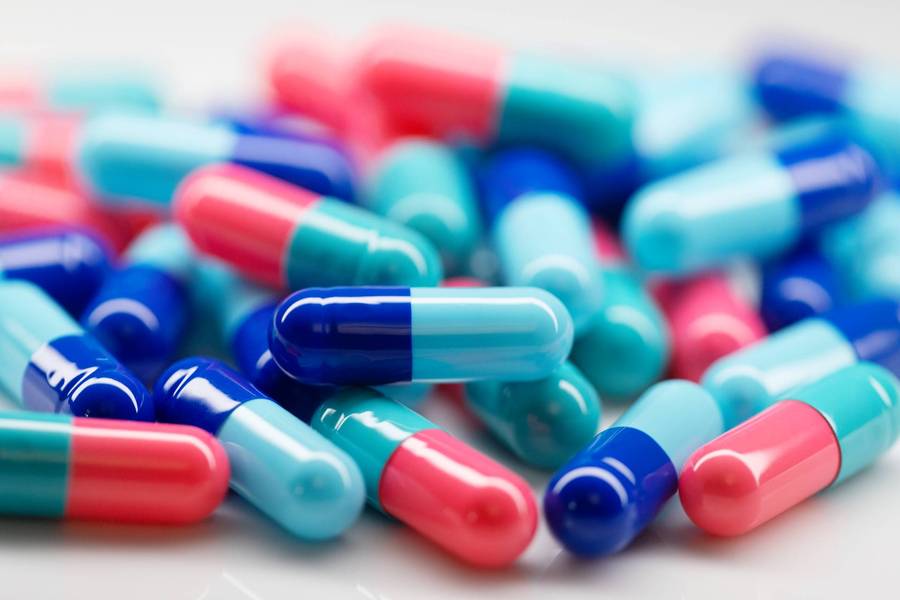
Encapsulation Evolution: A Catalyst for Transformative Change in Healthcare
Encapsulation Evolution: A Catalyst for Transformative Change in Healthcare
In the dynamic landscape of pharmaceutical development, innovation is the cornerstone of progress. As researchers, technicians and manufacturers continually strive to overcome challenges in drug formulation, delivery and patient adherence, one technology stands out for its transformative potential: encapsulation.Encapsulation, the process of enclosing active pharmaceutical ingredients within a protective shell, has revolutionized drug delivery. It provides solutions to myriad formulation hurdles such as: enabling the delivery of incompatible drugs, dual-release profiles, liquid filling with enhanced bioavailability, peptides for oral delivery, as well as enhancing the patient experience.This article delves into the multi-faceted benefits of encapsulation technology and its profound impact on pharmaceutical development — where empty hard capsules are not just containers but have become catalysts for real progress in healthcare.A Preferred Choice for Accelerated Product DevelopmentAmong the many options available, empty hard capsules have emerged as a preferred choice for encapsulating and delivering new chemical entities (NCEs), due to their versatility, compatibility and patient-centric advantages. Empty hard capsules offer unparalleled flexibility, accommodating a wide range of drug formulations, including solids, semi-solids and liquids. Their compatibility with diverse drug compounds, from poorly soluble to sensitive molecules, makes them an ideal choice for encapsulating NCEs with varied physicochemical properties. Whether it’s immediate or modified release formulations, enteric coating, or specialized delivery systems, empty hard capsules provide a customizable platform to meet the specific needs of NCEs both during development and commercialization.One of the primary challenges in NCE development today is achieving optimal bioavailability, especially for compounds with limited solubility issues. Empty hard capsules address this challenge by facilitating the formulation of drug compounds in bioavailable forms, such as lipid-based or self-emulsifying formulations.Additionally, the inert nature of hard capsules provides a readily available protective barrier against environmental factors, preserving the shelf life of NCEs, thereby ensuring product quality and compliance with regulatory standards.Ideal for Clinical TrialsDouble-blind clinical studies are the gold standard for evaluating the safety and efficacy of new pharmaceuticals, providing unbiased and reliable evidence for regulatory approval and clinical practice. Central to the success of these studies is the selection of appropriate dosage forms that ensure blinding integrity, dosing accuracy and patient compliance.Clinicaps, specialized capsules designed for clinical trials, have emerged as a preferred choice for encapsulating investigational drugs in double-blind clinical trials, offering unique advantages and considerations that enhance study integrity and efficiency.Empty hard capsules provide an ideal vehicle for encapsulating investigational drugs, as they can be easily filled with active or placebo formulations whilst — at the same time — maintaining identical appearance, size and taste. The opaque nature of hard capsules prevents visual identification of the encapsulated drug, further enhancing blinding integrity and minimizing potential sources of bias. Furthermore, the availability of different capsule sizes enables dose escalation or adjustment without compromising this integrity, which offers flexibility to accommodate varying dosing regimens in clinical trials.Empty hard capsules contribute to enhanced patient compliance by offering a convenient and familiar dosage form that is easy to swallow and tolerable for participants. Unlike tablets or powders, which may have undesirable taste or texture, capsules are generally well-accepted by study participants, minimizing the risk of non-compliance due to medication aversion or discomfort.Empty Hard Capsules: Guardians of Drug StabilityEnsuring drug stability is paramount in pharmaceutical formulation to maintain potency and efficacy throughout shelf life. Empty hard capsules serve as an indispensable tool in this regard, providing a protective barrier against moisture, oxygen and light, thereby safeguarding drug integrity.Moisture, oxygen and light pose a significant threat to the stability of sensitive drugs, ultimately leading to degradation due to hydrolysis, oxidation, or photolytic reactions, each of which respectively contributes towards loss of efficacy. Empty hard capsules act as a barrier, preventing ingress of moisture and minimizing oxygen permeation, thus protecting the encapsulated drug from the above deleterious effects. The physical barrier due to the thick shell wall ensures that the drug remains shielded from humidity and oxidative degradation, even in challenging storage conditions, thus extending shelf life and maintaining product quality. Opaque empty hard capsules offer light-blocking properties, shielding the encapsulated drug from photodegradation due to harmful UV and visible light, preserving product stability in light-exposed environments.The Efficiency of Capsules in Reducing ExcipientsUnlike tablets that often require multiple processing excipients, capsules have minimal requirement of excipients along with the drug substance to be filled in the capsule shell. This simplicity not only streamlines the formulation process but also reduces the complexity of regulatory submissions and quality control procedures, saving time and resource for pharmaceutical developers. By minimizing the number and quantity of excipients, capsules mitigate the risk of such interactions, enhancing the long-term stability and shelf life of pharmaceutical products. Moreover, the use of fewer excipients in the formulation process can improve patient safety by reducing the potential for allergic reactions, intolerances or any adverse effects associated with excipient exposure. Capsules also offer a more patient-friendly dosage form, as they eliminate the need for taste masking agents and coatings. As a result, this enhances patient acceptance and adherence to prescribed therapies, particularly in sensitive patient populations such as children, elderly individuals, or patients with swallowing difficulties.Making Multiple Dosage Strengths Cost-Effective and ScalableDuring the development and commercialization of pharmaceutical products, dosage variations are common to accommodate different patient populations and therapeutic regimens. Encapsulation technology simplifies the process of scaling up and modifying dosages without necessitating changes to the underlying formulation. For instance, a manufacturer producing a cardiovascular medication may need to offer multiple dosage strengths to accommodate patients with varying degrees of disease severity. Encapsulation allows for the seamless adjustment of dosage strengths by filling dose equivalent contents in readily available standard capsule sizes without re-developing the core formulation – saving time and resources. From a manufacturing standpoint, empty hard capsules offer cost-effective solutions for drug delivery. Their compatibility with high-speed encapsulation equipment allows for efficient and scalable production, reducing manufacturing costs and time-to-market for pharmaceutical companies.Tailoring Release Profiles and PharmacokineticsA real boon for formulators, empty hard capsules offer the flexibility to design tailored release drug profiles, to help optimize drug pharmacokinetics and therapeutic outcomes.By modulating the size, composition and coating of multiparticulate systems filled in capsules, researchers can tailor the release kinetics of drugs to match desired dosing regimens and therapeutic targets. This enables precise control over drug release profiles, minimizing fluctuations in plasma drug concentrations and reducing dosing frequency, therefore improving patient compliance, particularly for medications with narrow therapeutic windows or sustained therapeutic effects.Availability of ready-to-use delayed-release and enteric capsules enable drug release in the intestines, thus maximizing therapeutic efficacy of acid-sensitive molecules. Empty hard capsules have also proved to be an ideal carrier for formulating poorly soluble drugs, including lipid-based or self-emulsifying liquid formulations, thereby enhancing drug solubility and permeability — translating into higher systemic exposure and therapeutic efficacy.Enabling Product Differentiation & AestheticsIn today’s competitive market, product differentiation is essential for brand recognition and market success. Encapsulation technology provides opportunities for customizing capsule types, colors and printing options, allowing manufacturers to create distinct product identities. For example, a manufacturer may use encapsulation to produce visually appealing capsules using a variety of different colors and shapes, catering to consumer preferences, and enhancing brand recognition on store shelves. Additionally, encapsulation technology enables the delivery of multiple-colored pellets within a single capsule, enhancing the overall aesthetic appeal of pharmaceutical products. For instance, a multivitamin supplement may contain pellets of different colors representing various vitamins and minerals encapsulated together in a single capsule.ConclusionIn conclusion, encapsulation technology represents a pivotal advancement in pharmaceutical science, offering a multitude of benefits across the drug development continuum. From streamlining formulation processes to enhancing drug stability, bioavailability and patient adherence, encapsulation has proven to be a versatile and indispensable tool for researchers and manufacturers alike. With its various applications, encapsulation is not merely a technical innovation but a catalyst for transformative change in healthcare.Author DetailsDr. Subhashis Chakraborty, Head of Global Product Management- ACG CapsulesPublication DetailsThis article appeared in Tablets and Capsules Magazine: Vol. 22, No. 4 September/October 2024 Pages: 29-31
Read more

Why it is important for organizations to set long-term goals when planning for …
The Value in Committing to Conscientious Corporate Stewardship
Sustainability has become a real necessity and the pursuit of organizations across the globe, as many now throw down the scientific gauntlet.It is important for organizations to proactively set targets and focus on long-term initiatives that will provide value realization and business transformation toward creating a more sustainable and resilient future. Indeed, within our own business, our adherence to the Science Based Targets initiative (SBTi) through our strategic partnership with EY Parthenon1 underscores our commitment to conscientious corporate stewardship.At the time of the announcement, I had noted that our alliance with EY Parthenon marks a pivotal advancement in our sustainability pursuit and that by leveraging their esteemed expertise in industrial decarbonization, we are poised to expedite our net zero objectives, thereby effectuating a meaningful reduction in our carbon emissions. Keeping that in mind, when it comes to net zero objectives, I am referring to “we” as large-scale manufacturers.Overall, embarking on the journey toward decarbonizing entire processes will undoubtedly prove overwhelming for many. Still, if we want to restrict global temperature fluctuations, then it is one that we must all embrace.Ultimately, it’s about looking toward the future and trying to understand wide-ranging stakeholder needs to create long-term and effective solutions. When it comes to addressing environmental schemes and proposals, every part of the manufacturing process needs to be considered. Organizations could look at a number of measures to reduce their carbon footprint, which could include:• Implementing an energy management system and increasing the usage of renewable energy sources, including solar power. This is something we do, with the aim of reducing fossil fuel consumption by 20-25%.• Improving overall equipment effectiveness (OEE) by addressing machine time hours to reduce energy consumption.• Looking at how and which devices can be used with the internet of things (IoT), in order to continually monitor energy consumption, as well as to create energy-efficient designs.• Reducing waste generation within premises and upcycling where possible.• Promoting the use of electric vehicles and making the move toward hybrid models.• Undertaking sustainable practice through the use of zero liquid discharge, which can enable plants to save power and generate daily energy.• Creating biodegradable and compostable barrier films and coatings, promoting the use of single polymer plastics when it comes to packaging materials, while also working with companies to reduce overall packaging size.The mission to reduce the overall carbon footprint remains a driving principle for the pharmaceutical sector, with a focus on making manufacturing “contained, continuous and connected,” while optimizing raw material use and reducing waste.We must continue to work collectively to achieve this goal, ensuring clear communication and complete transparency. We are moving in the right direction and already we’re seeing visible gains.About the AuthorShivshankar S.R is the CEO of ACG Packaging Materials.Reference1. Kulkarni M. ACG Joins Forces With EY-Parthenon For Strategic Partnership. Pharma Now. June 13, 2024. https://www.pharmanow.live/latest-news/acg-joins-forces-with-ey-parthenon-for-strategic-partnership
Read more

Recognising the benefits of making Ayurveda more accessible and palatable from …
Modernising Ayurveda: transforming traditional remedies for global markets
Ayurveda translates to “knowledge of life” and is a natural system of medicine that originated in India more than 3000 years ago. It is based on the idea that disease is caused by an imbalance or stress in a person's consciousness.Associated treatments aim to encourage certain lifestyle interventions and natural therapies to restore the balance between the body, mind, spirit and the environment.1This emphasis on promoting balance and taking a natural/holistic approach to healthcare and well-being is a key contributor to Ayurveda’s increase in popularity and growth in new markets around the world.According to research quoted by the CBI Ministry of Foreign Affairs, the European Ayurvedic market is projected to reach a value of €1.6 billion by 2028 with an average annual growth rate of 12% for 2022–2028.2New markets, new opportunitiesThe growth and expansion of herbal medicines outside their native India is opening doors for new opportunities in product design and dosage forms — making the formulations more accessible and stable … as well as reducing manufacturing times and costs.One example of this is Kadha, a classic Ayurvedic formula described as being a decoction obtained after boiling a mixture of herbs with water under a low flame until the volume is reduced to form a concentrated solution/suspension. Kadha may be used as a medicine by itself or to prepare other dosage forms.3Traditionally, batches of Kadha would percolate for days on kitchen hobs and take a long time to produce. The result — effective as a home remedy — is generally bitter to taste and lacks standardisation, thereby limiting its marketability on a global scale.Packed into glass bottles, it also has a short shelf-life and expensive shipping costs. Finding a way to transform these traditional remedies into viable oral solid dosage (OSD) formulations is helping to tackle these challenges, smoothing the way toward growth and the widespread adoption of Ayurveda around the world.This article highlights a new chapter in Ayurveda’s evolution.It delves into how we at ACG (an original equipment manufacturer [OEM]) are teaming up with key industry players to help reduce the associated production times and manufacturing costs, while — at the same time — increasing the shelf-life and palatability of this ancient medicine.Trialling new techniquesEarlier this year saw one of the first trials combining the benefits of traditional Kadha with modern manufacturing methods using single-pot equipment to create viable OSD formulations without compromising on quality and efficacy — resulting in commercially available tablets to treat joint pain diseases such as osteoarthritis.At the start of the trial, a reputable Ayurveda company prepared a Kadha base from several medicinal extracts and concentrated it to form a dispersion with a solids content of 30–40%.The resulting viscous suspension was then evenly spread on trays to dry in the open.Once dry, the base formed a sticky hard cake, which was flaked, milled, sieved, blended, lubricated and — finally — compressed into tablets. This initial formulation process posed several challenges that needed solving, including the following:• an uneven material that required additional processing time• hours of manual work owing to multistep, multivessel procedures• batch-to-batch inconsistencies and variations in colour, taste, appearance, hardness and disintegration• long cleaning and changeover times• low yield, efficiency and productivity levels• a process that was too rigid to meet surges in demand• high transport and packaging costs• a short product shelf-life• high tablet-disintegration times.Overcoming the obstaclesTo address these issues and make the formulation process more technically and commercially viable, we — together with the client — studied the traditional processes involved in producing Kadha.This involved brainstorming ways to modernise it while still maintaining formulation integrity. A new fluid-bed process was introduced as a result. The Kadha decoction (30–45% solids) was sprayed and adsorbed on to a substrate with top-spray fluid-bed equipment.To ensure a more controlled agglomeration process, all process parameters were optimised, including air flow, spray rate, product temperature and exhaust temperature.Speeding up process timesThese changes yielded a simplified process with a substantial process time reduction: from several days down to 18 hours. The resulting product also met the requisite quality standards in terms of porosity, viscosity, flow characteristics and efficacy.This was achieved with ambient air flow conditions (without any dehumidification system) at the client’s facility.We were also able to further decrease the batch process time from 18 hours down to 10.5 hours (with no dehumidification) and then down to 9.5 hours by introducing a dehumidification system.Overall, compared with the manufacturer’s traditional method, the process was now 10 times quicker. A top-spray plant achieved another 44% reduction.Further productivity potentialAlthough the initial results from the trial have been encouraging, our technical team has developed more ways to enhance productivity, including• fine tuning the process parameters with a dehumidification system• partial addition of gum resin powder as a dry mix or extra-granular form• increasing the solid concentration of Kadha for greater yields.• More specifically, the compression process can be made more efficient by• eliminating the downstream process step of starch-paste granulation• optimising the concentration of extra-granular components/excipients such as disintegrants and lubricants (magnesium stearate)• optimising lubrication with magnesium stearate from 30 to 10 minutes• segregating the blending and lubrication steps• incorporating natural superdisintegrants to improve disintegration times• avoiding overdrying to control hardness and disintegration properties.Worldwide adoptionWith the results of trials such as these already on the shelves, the ever-improving manufacturing processes will continue to fuel the expansion, availability and popularity of Ayurveda products beyond their traditional roots.Converting Kadha-based formulations using modern technology promises to make Ayurvedic formulations more robust, efficient, reproducible and cost-effective, without compromising their efficacy.As manufacturers continue to improve and fine-tune these processes, shelf-lives will increase, packing and transportation costs will be reduced and patient compliance will improve — allowing people around the world to access and benefit from this ancient knowledge of life.Referenceswww.hopkinsmedicine.org/health/wellness-and-prevention/ayurveda.www.cbi.eu/market-information/natural-ingredients-health-products/trends#growing-interest-in-ayurvedic-and-traditional-medicine.www.ncbi.nlm.nih.gov/pmc/articles/PMC7329714/.https://nutraceuticalbusinessreview.com/modernising-ayurveda-transforming-traditional-remedies-for-global-markets
Read more
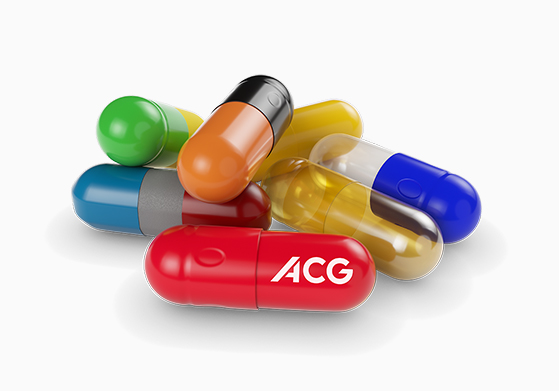
From Bitter to Better: How Capsules Improve Patient Acceptance of Medications
From Bitter to Better: How Capsules Improve Patient Acceptance of Medications
A number of factors can significantly affect medication acceptability, including product design, route of administration, dosage forms, taste, and appearance. These may sometimes be influenced by the physical and physiochemical properties of active ingredients or drugs. Among these factors, especially for the oral route of administration, taste, and odor have emerged as a major concern in pharmaceutical development, often posing a significant challenge due to the bitterness or unpleasant flavor of certain drugs and excipients. This inherent taste profile presents an often formidable task for formulators striving to create appealing products. In response to this critical aspect of healthcare, pharmaceutical companies are increasingly integrating criteria into their formulations aimed at improving medication acceptability while simultaneously preserving efficacy. These techniques involve employing strategies to mask or disguise the unpleasant taste and odor of medications, thereby enhancing their palatability and overall patient compliance.Amidst this, capsules have emerged as a valuable tool in taste and odor masking, offering an ideal solution for administering bitter and unpleasant-tasting medications. By encapsulating medication within a protective layer, capsules prevent direct contact with the taste buds in the mouth, thereby increasing patient acceptability and - in turn - compliance.Taste Masking in Oral PharmaceuticalsThe development of oral drug formulations demands meticulous attention to organoleptic properties, especially taste and palatability, given their significant impact on medication acceptability. They hold considerable importance not only in pharmaceuticals but also in gastronomical contexts, influencing consumer choice and adherence to medication regimens.Pharmaceuticals typically consist of pure drugs combined with additives, some of which may impart a bitter or unpleasant taste that affects the medication’s overall palatability. This can lead to potential reluctance or even refusal to take medication, making it essential for pharmaceutical companies to address taste concerns. For instance, drugs like antibiotics, anti-inflammatories, analgesics, antiepileptics, anticoagulants, oral vaccines, and sex hormones often have a dominant taste that significantly impacts how patients experience them. This taste can create a negative perception, which can deter patients from complying with their treatment plans. Consequently, opting for better-tasting alternatives poses challenges for pharmaceutical companies in terms of maintaining patient adherence and therefore subsequent profitability.Adherence problems are common among children and the elderly because of taste sensitivity. Children have more taste buds than adults, making them pickier about the flavor of medicines. On the other hand, the elderly often take multiple medications, which can make it harder for them to keep track and stick to their treatment plans. So, making medicines taste better is important to help them keep taking them regularly and get the best results from their treatment.In this context, capsules stand out as vital for ensuring adherence to medication. Renowned for their long-standing presence and numerous benefits, capsules hold a top spot among traditional dosage forms. Their superiority is underscored by their exceptional palatability, valued since ancient times. Capsules offer a range of advantages, including versatility in formulation, space for innovation, an appealing appearance, and – notably - effective taste masking. With their ease of use and widespread acceptance, capsules clearly play a significant role in promoting medication adherence.Factors Affecting the Taste of PharmaceuticalsTaste indeed pertains to the capability to identify the flavor of a substance upon its entry into the mouth. This recognition takes place as the drug dissolves in saliva and interacts with the taste buds. Hence, even minute quantities of a drug with a potent, unpleasant taste can be discerned upon exposure to saliva. Following exposure, this perception is transmitted to the gustatory receptors, specialized cells located on the taste buds, which then trigger the sensation of taste.In the case of pharmaceuticals there exist various parameters that can affect the overall taste of the formulation. These factors encompass the chemical structure of the active ingredient, the presence of functional groups, the solubility of the compound, its stability, concentration, and so on.Many active pharmaceutical ingredients (APIs) inherently carry bitter or unpleasant flavors, as a result of their chemical composition. These taste attributes are intrinsic to the compound and are difficult to alter. Specific functional groups present within the molecular framework of APIs play a role in bitterness. For example, compounds featuring nitrogen or sulphur atoms may induce bitter tastes. These functional groups engage with taste receptors on the tongue, eliciting a bitter sensation. Furthermore, aromatic compounds, characterized by benzene rings or analogous structures, can also contribute to bitterness.Certain additives or excipients possess the ability to chemically interact with the API, leading to alterations in its taste profile. These interactions may result in the formation of compounds with bitter or unpleasant tastes, thereby worsening taste-related difficulties in the formulation. Additionally, specific excipients are deliberately formulated to mask the taste of pharmaceuticals. However, there are occasions when these additives fail to adequately conceal the bitterness or unpleasantness of the drug, leading to a suboptimal taste experience for the patient.The hydrophobicity or water-repellent nature of certain compounds can affect their taste. These molecules tend to interact more strongly with taste receptors on the tongue compared to hydrophilic molecules. When hydrophobic APIs come into contact with saliva, they may linger longer in the mouth, allowing for prolonged interaction with taste receptors.Nevertheless, even with a comprehensive understanding of these compound characteristics, developers often encounter difficulties in significantly modifying the product to enhance its palatability, particularly during the developmental stage. This challenge is exacerbated by the paramount importance of ensuring the safety and efficacy of such compounds. This evaluation usually occurs in early-phase studies utilizing non-human primates, overlooking the palatability considerations frequently due to the absence of human subjects.At times, the therapeutic effect takes primacy importance over palatability modifications, leading to neglect of additional enhancements. Additionally, the physicochemical attributes of the drug, including solubility, permeability, and stability, place constraints on formulation strategies aimed at taste enhancement.However, in the current landscape, taste masking has become an essential aspect of development. Several methods are currently employed for the creation of palatable medications, some of which are outlined below.Taste Masking MethodsTaste masking methods encompass both traditional and advanced approaches to mitigate the unpleasant taste of medications. Conventional methods typically involve incorporating sweeteners and flavor enhancers. Recent advancements offer sophisticated techniques such as pro-drugs, ion exchange resins, hot melt extrusion, solid dispersions, microencapsulation, spray drying, and coating. However, these methods often entail complex processes and additional ingredients, which can affect the development timeline and manufacturing costs.In contrast, replacing taste masking methods with capsules offers a convenient alternative for enhancing medication palatability. By leveraging the inherent properties of capsules as a taste-masking dosage form, pharmaceutical developers can streamline formulation processes, enhance patient experience, and ultimately, promote better medication adherence and therapeutic outcomes.Capsules for Effective Taste MaskingCapsules present a straightforward yet highly effective solution to the challenge of taste masking in pharmaceutical formulations. Their inherent capability to act as a barrier between the drug and taste receptors minimizes direct taste perception, particularly beneficial for medications with inherently bitter or unpleasant tastes. Examples include drugs like quinine, celecoxib, etoricoxib, levofloxacin, ofloxacin, sparfloxacin, ciprofloxacin, cefuroxime, erythromycin, clarithromycin, ibuprofen, where simple flavors or sweeteners may not suffice due to their overpowering taste profiles, the capsule encapsulation may provide an effective solution. Additionally, it also aids in masking odors, further enhancing patient acceptance. The design of capsules facilitates effortless carrying and administration, augmenting their attractiveness. This convenience factor plays a significant role in encouraging patients to stick to their medication regimen, contributing to improved treatment adherence and ultimately better health outcomes.From a manufacturing standpoint, capsules stand out as the preferred choice in the pharmaceutical industry due to a number of core advantages. Their straightforward formulation process simplifies production, requiring fewer steps compared to complex taste masking processes. This reduction in complexity translates to saved time and resources during formulation development. Additionally, capsules offer cost-effectiveness, attributed to efficient manufacturing processes, making them a financially viable option for pharmaceutical companies. Furthermore, the ease of preparation enhances efficiency on the manufacturing line. Capsules can be filled with precision and consistency, minimizing production errors and maximizing output. Importantly, capsules eliminate the need for additional taste masking additives or coating agents, simplifying the formulation, and reducing the risk of potential interactions or side effects. It also maintains the bioavailability of the medication, ensuring optimal delivery of active ingredients without compromising absorption or efficacy due to their inert nature.In medication formulation, the dose of the specific drug utilized to treat the ailment holds significant importance. For instance, with low-dose drugs, there is ample space to adjust the taste profile of the formulation by incorporating additional excipients. However, high-dose drugs pose a challenge due to limited space for supplementary excipients. In such cases, capsules emerge as the optimal choice. It offers the flexibility to accommodate the drug without the need for extra excipients, effectively fulfilling their role in taste masking and pharmaceutical delivery.Furthermore, capsules represent a versatile option for pharmaceutical delivery, facilitating various formulation modifications to meet specific needs. In addition to providing a physical barrier, capsules can function as suitable containers to deliver the drug to the intended site of action. If necessary for the enhanced formulation need, it can encapsulate taste-masking agents or coated drug particles, further reducing the likelihood of taste detection until the capsule dissolves in the gastrointestinal tract. This additional safeguard shields patients from unpleasant pharmaceutical tastes, streamlining taste masking while bolstering patient acceptance and adherence through the familiar and more palatable dosage form.In addition to their formulation flexibility, capsules offer a notable array of customization options. They possess the versatility to accommodate a wide range of drug formulations, encompassing immediate-release, extended-release, and modified-release variants, all while retaining their taste-masking properties. Moreover, capsules can be tailored with varying shell compositions, sizes, and colors. These present opportunities for personalized medication delivery, which aligns precisely with consumers’ preferences and requirements.The capsule shell, typically composed of materials such as gelatin, HPMC, or acrylate polymers, serves as a protective barrier for the encapsulated drug. This polymer shell is widely favored in pharmaceutical capsules for its ability to form a sturdy, flexible, and taste-neutral enclosure. HPMC capsules, for instance, are renowned for effectively masking the taste of drugs, ensuring a seamless and pleasant swallowing experience for patients.Moreover, with recent advancements, the capsule shell itself can undergo further modifications to incorporate flavors if desired. Capsule formulation allows for the addition of flavoring agents, enabling the outer membrane to impart a specific taste to the medication. These flavored capsules offer an additional dimension of customization, enhancing patient acceptability and compliance by catering to individual taste preferences.SummaryIn the rapidly evolving therapeutic landscape, patients are becoming increasingly discerning about their choices, even within the pharmaceutical sector. The medication acceptability is becoming essential during product development, particularly considering the taste and palatability of oral pharmaceuticals. Despite being the simplest method of pharmaceutical administration, oral formulations have demonstrated effectiveness in delivering both simple and complex molecules. However, to enhance formulation acceptability and align with industry trends focusing on palatability, numerous adaptations have been made.A successful oral dosage form should not only be effective but also enhance palatability and garner patient acceptance. The pharmaceutical industry has significantly contributed to meeting these objectives through various methods. Among these, capsule dosage forms emerge as a straightforward yet effective solution. Leveraging their inherent properties, capsules improve taste perception and increase patient acceptance, making them a preferred option for delivering medications effectively while ensuring a positive patient experience. With the simplicity and effectiveness of capsule formulations, they have become an effective means to enhance palatability and acceptability in pharmaceuticals.Author DetailsJnanadeva Bhat- Head-R&D-Formulation development (Pharma & Nutra), ACG; Manali Dalvi- Lead-R&D-Whitepaper and publications; (Pharma & Nutra), ACGPublication DetailsThis article appeared in American Pharmaceutical Review:Vol. 27, No. 5July/Aug 2024Pages: 55-57https://www.americanpharmaceuticalreview.com/Featured-Articles/614440-From-Bitter-to-Better-How-Capsules-Improve-Patient-Acceptance-of-Medications/
Read more
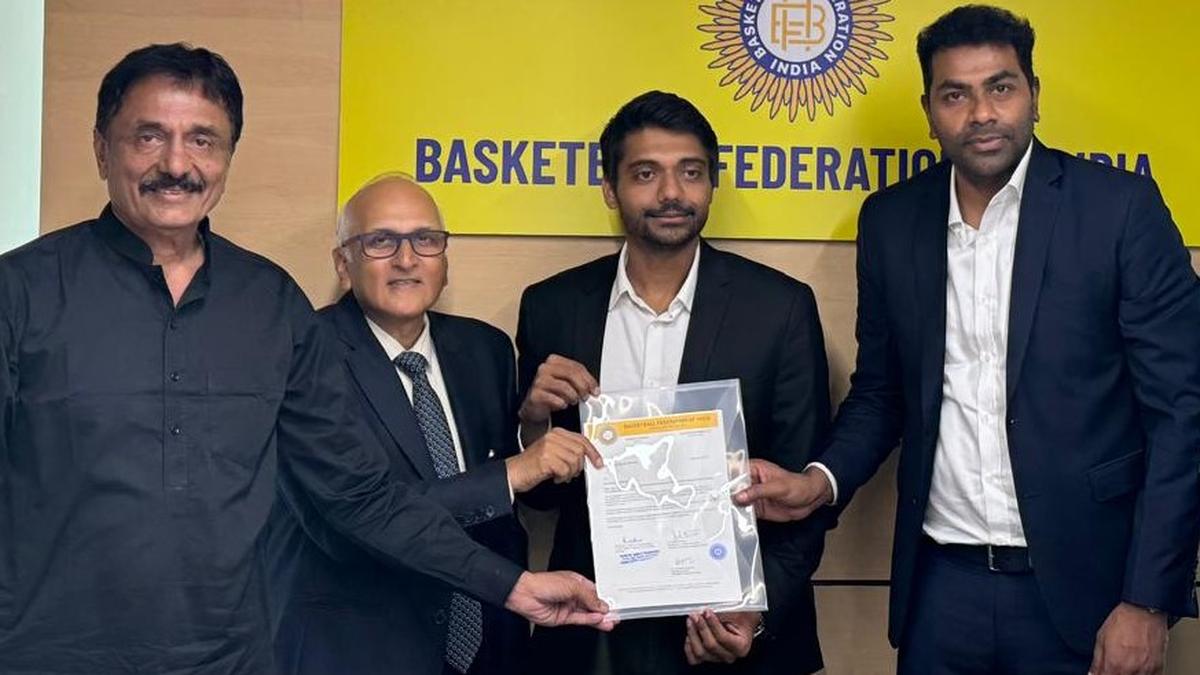
BFI president Aadhav Arjuna, right, and secretary general Kulvinder Gill, left,…
BFI signs seven-year deal with ACG Sports for professional basketball league
Addressing the media here on Friday, the president of BFI, Aadhav Arjuna said that for each year, the amount would be Rs. 20.6 crore rupees for the 5x5 format and Rs. 10.3 crore for the 3x3 format.“It was a transparent system, and we gave it to the highest bidder. It is a medical group of companies, and has already been associated with supporting basketball through many events,” said the BFI president al Star Basketball League in Delhi on Friday.The Basketball Federation of India (BFI) has signed a seven-year deal with ACG Sports Limited, with a guarantee of Rs.216.30 crore for hosting the National Star Basketball League for men and women.Addressing the media here on Friday, the president of BFI, Aadhav Arjuna said that for each year, the amount would be Rs. 20.6 crore rupees for the 5x5 format and Rs. 10.3 crore for the 3x3 format.“It was a transparent system, and we gave it to the highest bidder. It is a medical group of companies, and has already been associated with supporting basketball through many events,” said the BFI president “It is a new beginning for Indian basketball. We hope to pay substantial money to our players. We call all the big corporate companies and sponsors to invest in the league and make it a success,” Arjuna said.“We will host both the men’s and women’s leagues. The BFI would hold 100% ownership of the league so that we put the revenue generated back into the game for our developmental projects,” he said.It was stated that about 100 Indian players would stand to benefit from the league, which would also feature about four foreign players in each team.“We call all the players and coaches, to be ready, and to be fit, for the new journey,” said Arjuna.The league is expected to feature 10 men’s teams, and eight women’s teams.While the 5x5 format is expected to be played in stadiums, the 3x3 format could be staged on the beach, parks and malls so as to take the game to the people.The BFI president also said that he had an extensive tour of the USA to collaborate with the NBA for the betterment of Indian basketball.“We already have Scott Flemming for the men’s team. We will soon have an American coach for the women’s team and an American fitness coach also,” he said.Some of the money generated from the league is expected to be invested in making world-class infrastructure for Indian basketball.“In the USA, even colleges have a world-class stadium,” said Arjuna.The secretary general of BFI, Kulvinder Gill said, “Now Indian players can take up basketball as a career. We have enough talent in the country to nurture and build.”The details of the teams, structure, venues and fixtures are expected to be announced in a few weeks time. Source: BFI signs seven-year deal with ACG Sports for professional basketball league
Read more
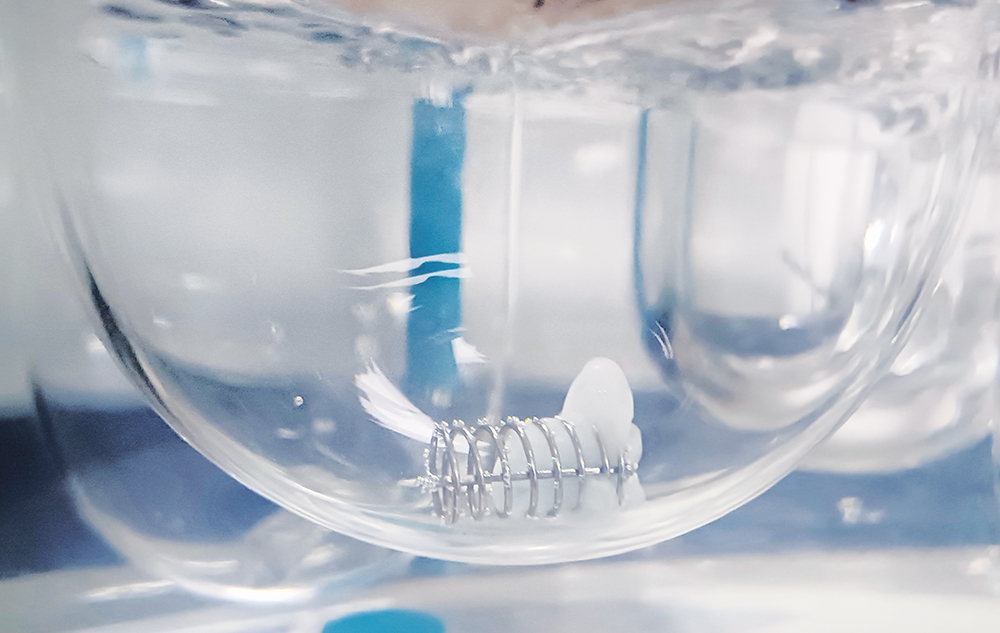
Strategies to mitigate gelatin cross-linking in oral solid drug delivery
Strategies to mitigate gelatin cross-linking in oral solid drug delivery
The oral solid drug delivery system is a prominent mode of drug administration. It is recognised for being non-invasive, patient compliant and convenient; steadfastly catering to the multifaceted demands of the market through its pioneering methodologies.Despite the emergence of cutting-edge techniques such as biologics, molecular delivery and parenteral administration, the prevalence of solid delivery systems continues to undergo ongoing innovation. From traditional pills and capsules to novel variations, such as gummies, soft chews, granules, lozenges and pastilles, the oral delivery mechanism has revolutionised pharmaceutical formulations, capturing the attention of both healthcare professionals and consumers. Its adaptability, accessibility and effectiveness have propelled it to the forefront, surpassing even the established parenteral and intravenous routes.Irrespective of the product type, the fundamental goal of processing oral solid dosage (OSD) forms remains unwavering: to create formulations that guarantee consistent dosing, reliable distribution of ingredients, and uniform dissolution and bioavailability. However, achieving this objective is contingent upon the dosage forms, actives and excipients employed.Gelatin often serves as a crucial excipient in OSD formulations. Whether encapsulating active ingredients within hard or soft shells or serving as a coating agent for tablets or a gelling agent in any other formulations, gelatin emerges as a fundamental ingredient across various oral delivery formats. Its versatility finds applications in a wide range of dosage formats.However, despite its extensive use, OSD manufacturers grapple with a persistent challenge: gelatin cross-linking within formulations, initially observed in 1974 for hard capsules containing chloramphenicol. This phenomenon poses a threat to the dissolution of pharmaceutical products, underscoring the need for strategies to mitigate such barriers. As we navigate the complexities of drug formulations, addressing issues such as gelatin cross-linking becomes paramount in advancing the efficacy and reliability of oral drug delivery systems.CROSS-LINKING IN THE GELATINFollowing the ingestion of gelatin capsules or gelatin-coated tablets, the primary objective of the formulation lies in releasing the inner content into the biological media. However, it is often observed that gelatin-based formulations tend to experience dissolution failures upon ageing, which is primarily attributed to cross-linking in stressed gelatin-containing products. It causes the formation of a swollen, thin, tough, rubbery, water-insoluble membrane, known as a pellicle (Figure 1). This may act as a barrier to the drug release from the formulation, resulting in the slower release of the filled formulation, which consequently leads to a decrease in dissolution values or no release at all in in vitro studies. The degree of cross-linking can vary within and between capsules, making it difficult to predict the extent of the issue. Once formed, these pellicles are irreversible, rendering the gelatin insoluble. As a consequence, dissolution results will have higher variability when gelatin capsule/coated tablets are cross-linked. This phenomenon – during the early stages of drug insertion into the market – often results in failure to meet regulatory guidelines for in vitro studies, prompting regulatory authorities to recall the product.MECHANISM OF GELATIN CROSS-LINKINGGelatin, derived from collagen via hydrolysis, is a soluble protein mixture primarily composed of amino acids (Figure 2). These amino acids, linked by amide bonds, form a linear polymer with molecular weights ranging from 15,000 to 250,000. Cross-linking in gelatin can arise from chemical interactions between its peptide chains or individual amino acids. These interactions can be triggered by small amounts of aldehydes, which are present in excipients or APIs. They may also occur from the breakdown of formulation components or packaging materials – or exposure to harsh conditions such as high temperatures and humidity. Figure 2: Gelatin structure.There are two main types of cross-linking reactions observed in gelatin: internal and external. Internal cross-linking takes place when gelatin capsules are exposed to high temperatures and humidity, primarily affecting their inner surfaces. In contrast, external cross-linking occurs when gelatin-based formulations, such as hard or soft capsules and gelatin-coated tablets, interact with substances such as aldehydes, peroxides or sulfonic acids.These substances cause chemical changes in the gelatin molecules, transforming them from a random coil configuration to a collagen triple helix structure.The mechanism of gelatin cross-linking involves three distinct pathways, each driven by specific molecular interactions and catalytic factors.Intrastrand and Interstrand Cross-Linking: Gelatin’s reactivity stems from interactions among amino acids within the same gelatin molecule (intrastrand) or between neighbouring molecules (interstrand). Key amino acids involved in this process (most notably lysine) exhibit trifunctional properties. Lysine residues in close proximity undergo oxidative deamination, yielding terminal aldehyde groups. These aldehyde groups can then react with neighbouring ε-amino groups of lysine, forming imine intermediates. Subsequent aldol condensation reactions lead to the formation of cross-linked products containing pyridinium rings. This cascade of reactions is catalysed by external factors such as heat and relative humidity or the presence of a chemical agent.Reaction with Carbonyl Groups: Another mechanism involves the interaction between lysyl ε-amino groups and aldehydic impurities present as contaminants. This reaction generates hydroxymethylamino derivatives, which undergo dehydration to form imines. These imines then engage in further reactions with hydroxymethyl lysine residues, forming dimethyl ether bridges. Ultimately, rearrangement reactions result in methylene linkages between lysyl ε-amino groups, facilitating cross-link formation. Similar reactions can occur with aldose sugars commonly found in pharmaceutical formulations, wherein imine intermediates react with free amino groups to yield ketose sugars. Subsequent reactions between imines and sugars lead to cross-linking via carbonyl functionalities.Formation of Aminals: Additionally, gelatin cross-linking can occur through the formation of aminals, which are amine derivatives of acetals. This process is influenced by the pH of the environment. Aminals formed between gelatin chains contribute to cross-linking, further enhancing the structural integrity of the gelatin network.FACTORS CONTRIBUTING TO GELATIN CROSS-LINKINGCross-linking in gelatin formulations can stem from various environmental and chemical factors, significantly impacting their stability and performance (Table 1). Drug NameDosage FormUSP ApparatusSpeed (RPMs)MediumVolume (mL)Recommended Sampling Times (minutes)UpdatedLopinavir/RitonavirCapsulte (Soft-Gelatin)II (Paddle)50Tier 1: 0.5 M Polyoxyethylene 10 Lauryl Ether with 10 mM Sodium Phosphate monobasic (pH 6.8) Tier II: same as above with NMT 1750 USP units/L of Pancreatin90010,15, 30 and 4506/18/2007CelecoxibCapsuleII (Paddle)50, 100 and 200 mg: 50 rpm; 400 mg: 75 rpmTier I Medium: 0.04 M tribasic sodium phosphate (pH 12) with 1% SLS. Tier II Initial Medium: 750 mL of simulated gastric fluid, USP (includes pepsin); At 20 minutes, while stirring, add 180 mL of appropriate concentrations of SLS solution (for a final concentration of 1% SLS). Add about 70 mL of 1.2 N NaOH to adjust the pH to 12.Tier I: 1,000 mL Tier II: 750 mL (initial) 1,000 mL (final)10, 20, 30, 45 and 6007/01/2010Table 1: Representative two-tier dissolution method.Environmental FactorsElevated humidity, temperatures and intense light exposure can trigger cross-linking reactions within gelatin-based formulations, resulting in prolonged in vitro dissolution times. The presence of high humidity facilitates direct catalysis of imine formation, a crucial step in cross-linking reactions.Additionally, certain excipients may produce byproducts in moist environments, further promoting cross-linking. For example, corn starch may contain hexamethyl tetramine, which decomposes in humidity, generating ammonia and formaldehyde, thus facilitating cross-linking in gelatin. Moreover, high humidity conditions can induce arginine-arginine cross-linking in gelatin. Elevated temperatures accelerate the rate of cross-linking reactions, hastening the formation of insoluble gelatin networks.Light or ultraviolet (UV)-visible radiation exposure can influence dissolution properties. Intense light exposure correlates with reduced in vitro dissolution rates, adding complexity to the matter of gelatin cross-linking in pharmaceutical products.Chemical FactorsSeveral chemical factors can exacerbate gelatin cross-linking in pharmaceutical formulations (Table 2). HumidityHeatLightExcipients or APIs with carbonyl functional groupAldehydes (furfural, acrolein, formaldehyde, glyceryl aldehyde) and ketonesIminesSugars (glucose and aldose sugar)Oxidising agentPEGs (containing peroxide/aldehydes)Metal ions (colorants/dyes)Sulfated polysaccharides (chondroitin sulfate)Table 2: Causative agents for cross-linking.One prominent contributor is formaldehyde, which can be released from various sources commonly found in formulation excipients. These sources include plasticisers, preservatives and polyethylenated compounds, such as polyethylene glycol (PEG). Interestingly, ethers of PEG, aliphatic alcohols or phenols, polyethylenated glycerides and non-ionic surfactants can all contribute to formaldehyde release, thus promoting the cross-linking of gelatin. PEGs, frequently employed as solvents in pharmaceutical formulations, can release low-molecular-weight aldehydes when exposed to aerobic conditions, thereby further enhancing gelatin cross-linking. Additionally, aldehydes such as furfural, commonly found in bottles containing rayon coils, have been demonstrated to react with gelatin, resulting in the formation of insoluble cross-linked products.To confirm whether gelatin cross-linking has occurred, instrumental techniques such as various spectroscopies have been applied, including nuclear magnetic resonance (NMR), UV spectroscopy using 2, 4, 6-trinitrobenzene sulfonic acid (TNBS) assay, fluorescence spectrophotometry (FS), near infrared (NIR) and Fourier transform-infrared (FT-IR). However, it is important to note that these spectroscopic techniques may have limitations for identifying cross-linking in gelatin capsule shells when the formulations experience dissolution slowdown due to stress tests in stability studies or a long-time storage of marketed formulations.STRATEGIES TO MITIGATE THE CHALLENGE POSED BY CROSS-LINKING IN GELATIN-BASED FORMULATIONSOvercoming the challenge of cross-linking in a dissolution study is crucial for innovators facing hurdles in the in vitro evaluation of gelatin formulations. Fortunately, there are several ways to mitigate the issue of cross-linking within the formulation. One such approach involves leveraging different grades of gelatin, each exhibiting distinct behaviours regarding cross-linking. Notably, type B gelatin demonstrates reduced cross-linking compared with type A gelatin.Another effective approach involves inhibiting the formation of aldehydes, which are crucial catalysts for cross-linking in capsules. Compounds such as lysine, phenylalanine, glutamine, p-aminobenzoic acid and glycine serve as potent scavengers for carbonyl compounds, obstructing aldehyde interaction with the gelatin shell and thereby significantly reducing cross-linking. Using glycine to scavenge aldehydes in the formulation effectively neutralises reactive aldehydic functional groups, preventing further cross-linking. Furthermore, combining glycine with citric acid proves highly effective, offering dual benefits by scavenging aldehydes and facilitating pH manipulation within the formulation.Other inhibitors, such as semicarbazide, piperidine and hydrochloride, can also modify capsule properties, effectively inhibiting cross-linking. An alternative approach involves using aldehyde-free excipients, presenting a promising avenue for tackling the dissolution challenge. Importantly, safeguarding formulations against moisture, temperature fluctuations and light exposure will also play a pivotal role in maintaining stability and preventing undesirable cross-linking reactions.A collaborative effort between the US FDA’s CDER, the United States Pharmacopeia (USP) and academia in the early 1990s yielded valuable insights into gelatin capsule non-compliance during dissolution tests and its impact on bioavailability.1 Notably, while cross-linking primarily occurs in vitro, the behaviour shifts markedly during in vivo testing. Cross-linked capsules face minimal hurdles in vivo, suggesting a divergence between laboratory and real-world outcomes. This is due to the presence of the enzymes in the gastrointestinal (GI) environment acting as biological scissors, effectively breaking down the cross-linked bonds in capsule shells.This research led to the development of two-tier dissolution testing, which incorporates enzymes into the dissolution medium in some cases to account for potential in vivo enzyme activity, highlighting the importance of considering both in vitro and in vivo data when evaluating drug delivery systems. The USP two-tier dissolution method offers a standardised approach for handling formulations that fail initial dissolution assessments. This methodology aligns well with bioequivalence studies, streamlining processes and reducing associated time and costs.The USP General Chapters Dissolution <711>and Disintegration and Dissolution of Dietary Supplements <2040> offer provisions for incorporating enzymes into dissolution media when dosage forms fail to meet dissolution acceptance criteria due to gelatin cross-linking. More than 25 pharmaceutical products have used two-tier dissolution methods, as per the FDA’s dissolution database and USP standards (Table 1). In particular, GI enzymes such as pepsin and pancreatin have proven effective in breaking down cross-linked gelatin within the stomach, operating within specific pH ranges to optimise protease activity. By integrating these enzymes into dissolution studies, the observed slow drug release in vitro can be addressed effectively. This strategic inclusion ensures that dissolution assessments accurately reflect the intended performance of the formulation, aligning with regulatory standards and facilitating robust evaluation of product efficacy.The implementation of two-tier dissolution testing – primarily introduced in the First Supplement of USP 24 – involves the strategic addition of enzymes to dissolution media. Pepsin, added to acidic mediums or water, aims for an activity level of 750,000 units per litre or less. However, it demonstrates optimal proteolytic activity up to pH 4 and diminishes above pH 5.5, rendering it unsuitable for two-tier dissolution testing when the medium exceeds pH 4.On the other hand, pancreatin USP, included in mediums at or above pH 6.8, targets a protease activity level of not exceeding 1,750 units per litre. Pancreatin, renowned for its wide substrate specificity, boasts enzymes such as trypsin, α-chymotrypsin, carboxypeptidase, lipase and amylase, enabling it to hydrolyse proteins, fats and polysaccharides effectively. With a favourable proteolytic activity range around pH 6–8, pancreatin presents a versatile option for addressing gelatin cross-linking during dissolution testing.While pepsin and pancreatin offer valuable solutions for in vitro dissolution challenges, it is important to acknowledge their limitations in mimicking in vivo conditions fully. Factors such as the presence of bile salts and gastric motility, crucial in vivo mechanisms, are challenging to replicate accurately in routine dissolution testing. At this point, enzymes such as papain and bromelain, derived from papaya and pineapple, respectively, could be considered. These enzymes, not naturally found in the human body, are primarily employed to digest cross-linked gelatin during dissolution tests. Papain, with an optimal pH range of 4–7, and bromelain, optimal at pH 4.5–7.5, both exhibit potent protease activity and can be evaluated using the case in digestive power test, as delineated in the USP monographs.While these remedies offer promise in resolving the cross-linking challenge, careful consideration must be given to the cautionary note regarding the use of other additive media components when designing dissolution media. For example, the inclusion of surfactants such as sodium lauryl sulfate for solubility enhancement can compromise the activity of enzymes, introducing complexities in the two-tier dissolution study (Table 1). In such cases, a prudent approach involves pre-treating cross-linked gelatin capsules with enzyme-containing media devoid of surfactants. This ensures the maintenance of enzymatic activity, thus preserving the accuracy of dissolution testing. By navigating these intricacies thoughtfully, researchers could optimise dissolution protocols to emulate physiological conditions, thus enhancing the reliability of their findings more closely.SUMMARYWhile cross-linking in gelatin-based pharmaceuticals may pose challenges to dissolution during in vitro studies, it is important to note that in vivo dissolution is often unaffected. This is due to the enzymatic activity within the GI tract which digests cross-linking efficiently, aiding dissolution. Nonetheless, despite this natural process, several precautions should be taken to ensure regulatory acceptance of the product.Various strategies exist to prevent cross-linking during the formulation stage. These include tailoring gelatin formulations to specific grades, incorporating cross-linking inhibitors, integrating stability enhancers or exploring alternative excipients less prone to cross-linking. These approaches effectively mitigate cross-linking issues.However, if cross-linking does occur during formulation, strategic use of the USP two-tier dissolution method would be crucial, especially in capsule formulations. Optimising dissolution studies in this manner can enhance pharmaceutical evaluations, supporting the reliability and efficacy of drug development processes. Through these proactive measures, researchers can confidently and precisely navigate the complexities of cross-linking in gelatin-based pharmaceuticals.REFERENCEAikman M et al, “Collaborative development of two-tier dissolution testing for gelatin capsules and gelatin-coated tablets using enzyme-containing media”. Pharmacopeial Forum, Vol 24(5), Sep-Oct 1998. Source: Strategies to mitigate gelatin cross-linking in oral solid drug delivery
Read more
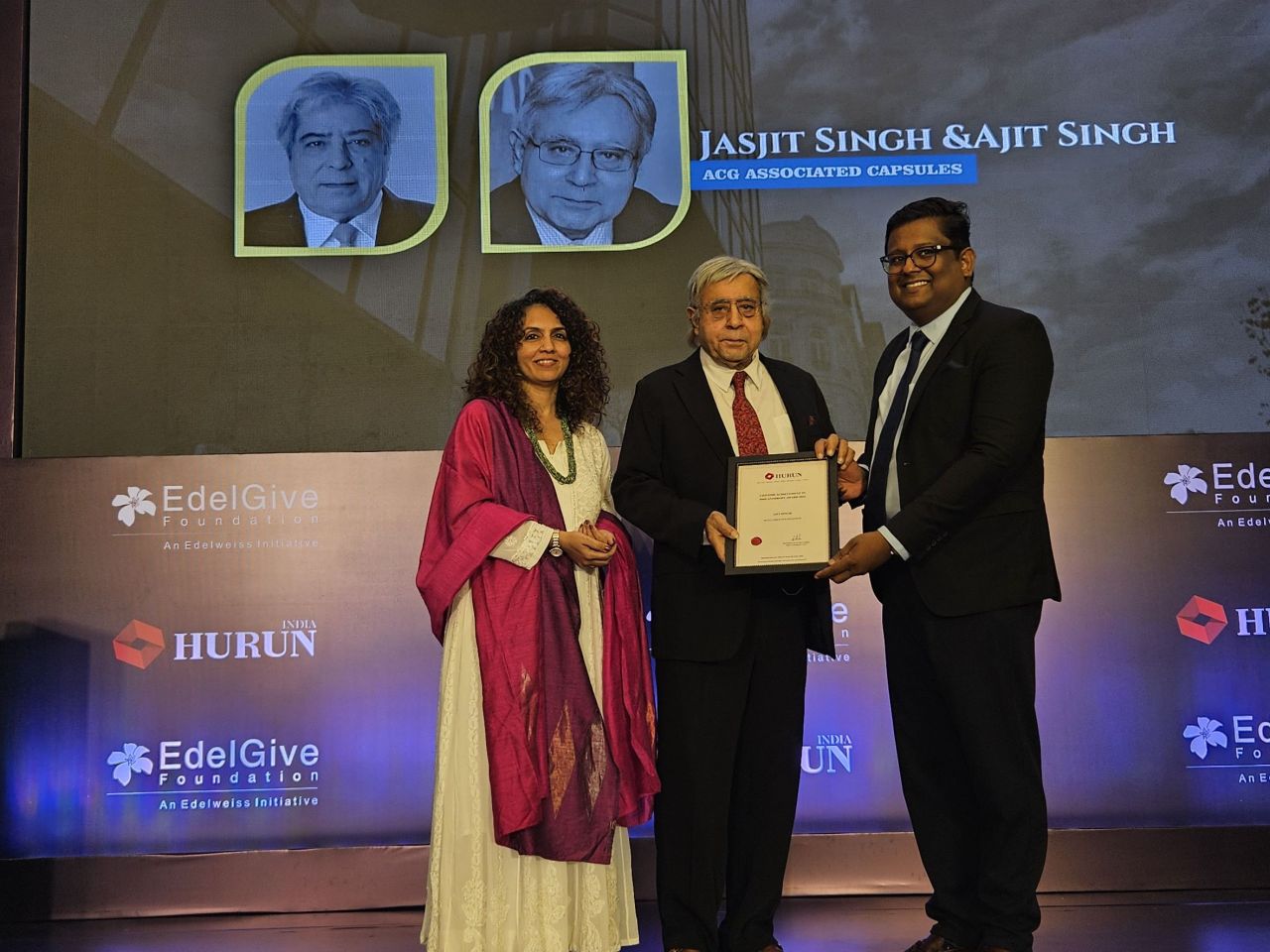
Ajit Singh, Jagjit Singh from ACG receive Lifetime Achievement Award from Hurun…
Ajit Singh, Jagjit Singh from ACG receive Lifetime Achievement Award from Hurun India
Ajit Singh, Chairman, ACG and Jasjit Singh, Vice Chairman, ACG have received Lifetime Achievement Awards from Hurun India.The Singh brothers joined the ranks of previous recipients such as Cyrus and Adar Poonawala of Serum Institute of India, K Dinesh, Co-Founder, Infosys and Jalaj Dani, Co- Promoter, Asian Paints.The Singh brothers acknowledged the support received from the pharma industry, their families, the ACG Global Leadership, ACG team, ACG Cares Foundation, and their customers and suppliers, during their acceptance speech.They also spoke about ACG’s values and emphasised their commitment to industry and philanthropy. Source: https://www.expresspharma.in/ajit-singh-jagjit-singh-from-acg-receive-lifetime-achievement-award-from-hurun-india/
Read more
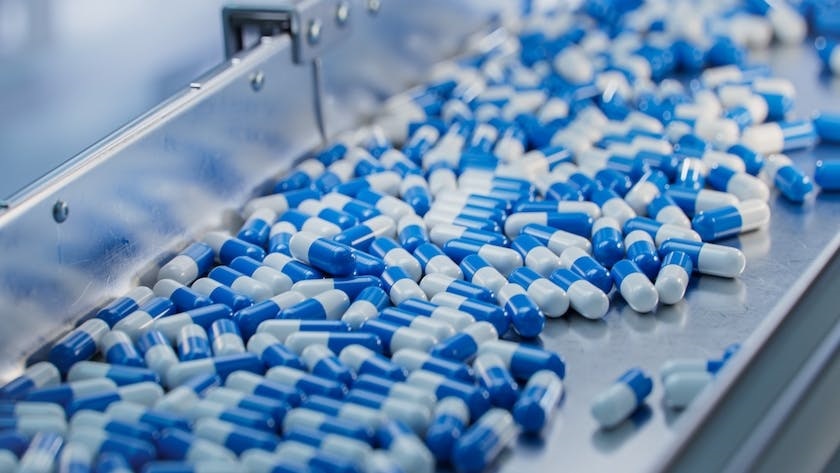
What groundbreaking innovations lie ahead for capsules and how will these devel…
The untapped potential of drug capsules
Today’s health care market is overflowing with myriad products, making it increasingly difficult for businesses to stand out. This is particularly true for oral dosage forms, which currently account for over 80% of the market. This creates a daunting challenge for drug developers who must continually innovate in order to differentiate products. Unlike prescription drugs, the visibility of over-the-counter (OTC) medicines on the shelf play a significant role in consumer decision-making. In a saturated market where consumers are constantly bombarded with choices, product differentiation allows a brand to distinguish itself and gain competitive advantage by highlighting its unique features, benefits or qualities. It can also contribute to building brand loyalty, attracting a specific target audience, and done correctly it can enable a company to charge a premium for its distinctive offerings.Achieving product differentiation in these sectors is not without challenges, however. Stringent regulatory requirements can limit the scope for innovation, necessitating companies to navigate complex approval processes. Moreover, the restrictions on advertising prescription drugs poses a significant hurdle for pharmaceutical companies. Overcoming these challenges requires a delicate balance between scientific credibility, regulatory compliance, and effective marketing strategies to establish a brand as a trusted and differentiated player in the market.Capsules are a widely adopted oral dosage form for pharmaceutical use and are favored by formulators for their versatility. Patients and consumers appreciate capsules for their convenience. They offer a convenient and easily ingestible option for delivering a range of active ingredients, ensuring high dosage adherence. Nevertheless, researchers may have overlooked the potential of capsules as a product differentiator. Despite the continual advancements, the pharma industry has yet to witness a revolutionary breakthrough in the design or functionality of empty hard capsules. The question looms: What groundbreaking innovations lie ahead for capsules, and how will these developments redefine their role in drug delivery? Capsules for every purposeCapsules offer a versatile range of ready-to-use options that extend beyond the more conventional immediate-release applications for powders. For example, the possibility of delayed-release and enteric capsules have proven invaluable for formulations like enzymes and probiotics, requiring protection from stomach acid and necessitating targeted delivery in the intestines. Delayed release ensures that active ingredients reach their intended site of action, enhancing the efficacy of the pharmaceutical or nutraceutical products in question.The ability to encapsulate liquids, semi-solids, and pastes in a single unit also sets capsules apart from other dosage forms. This diverse application supports precise dosing, as compared to solutions and suspensions dispensed via bottles. Capsules also offer a unique solution for formulating poorly soluble drugs, enabling the use of lipids as a carrier to enhance their solubility and bioavailability. They offer a plethora of liquid-filled combinations, such as capsule-in-capsules, pellets-in-capsules and tablets-in-capsules which, when delivered in clear transparent capsules, also provide an aesthetic appeal to the final product. In addition, the smooth surface and easily ingestible nature of capsules contributes to a positive consumer experience, a crucial factor in today’s competitive landscape.Moreover, the unique advantage of encapsulating various active ingredients — even if they are incompatible — within a single capsule presents new possibilities. This addresses specific patient compliance challenges, by offering a convenient means of administering multiple medications or supplements simultaneously, to help simplify treatment regimens.Beyond conventional methods The simple idea of sprinkle capsules, utilizing standard capsules in the drug delivery system, stands as an excellent example of value-added product differentiation. This innovation, made possible through capsules, sets it apart from other oral dosage forms. It offers significant benefits, particularly to geriatric and pediatric patients with swallowing difficulties, where a capsule can be opened to disperse its contents over liquid or soft food for ingestion. And, in both cases, the convenience and adaptability of sprinkle capsules contribute to improved patient compliance.Tabsules — featuring a caplet enclosed in two identical capsule shells — provide a multifaceted approach to product enhancement. Not only do they offer tamper-proofing, serving as a visible indicator of product integrity, but tabsules also offer a competitive advantage by providing an innovative approach to existing formulations without the need for a comprehensive reformulation. This innovation allows companies to refresh their product presentation without compromising the established formulation. Additionally, tabsules contribute to an improved customer experience by masking the potentially bitter taste of tablets and facilitating easier swallowing.Clinicaps are capsules with unconventional dimensions customized to enable execution of double-blind clinical trials. These are engineered with relatively longer caps to ensure a tamper-evident design. They have broader width and available in different lengths which facilitates the concealment and blinding of large or uniquely shaped tablets or other forms of solid oral dosages. This unconventional design can be leveraged to serve as a visual differentiator, enhance aesthetic appeal and communicate a sense of innovation adding value and uniqueness in a saturated market. Naturally clean capsulesToday’s consumers are well-informed and are increasingly conscious of what they’re consuming. This has translated into a rising demand for all things natural and clean. In recent years, the shift from animal-sourced gelatin towards plant-based alternatives has marked a significant evolution in the realm of empty hard capsules. Among these alternatives, hydroxypropyl methylcellulose polymer (HPMC), has emerged as the front-runner, holding an undeniable dominance in the capsule market. HPMC caters to vegetarian and vegan consumers, while delivering performance characteristics comparable to gelatin. This remarkable balance of suitability and performance has cemented HPMC's position as the leading capsule polymer. In line with this growing demand for animal-free products, new-generation polymers like pullulan and starch are also gaining prominence in capsule manufacturing. These polymers, renowned for their exceptional film-forming properties and stability, are making waves as compelling alternatives. Their versatility allows them to encapsulate a diverse range of formulations, catering to the evolving needs of the pharmaceutical and nutraceutical industries.With natural choices gaining prominence, the evolution of capsules extends beyond the choice of polymers to encompass the coloring agents used. Today's capsules can now be colored using natural colorants derived from fruits, vegetables or plant-based sources.Transformative capsule customizationToday, almost endless capsule customization options exist — helping to make brands become instantly recognizable.For example, the introduction of capsules with a pearl-like finish offers exciting possibilities for creating aesthetically appealing products, particularly for nutraceuticals or cosmetics. This innovative approach aligns with premium consumer expectations, adding elegance and luxury to capsules to help them stand out on shelves. Furthermore, the array of customizable printing options for capsules can enhance product distinctiveness and brand appeal. From intricate logos to specific color combinations, these techniques allow companies to align capsules with brand aesthetics.360° printing — a technology that's difficult to replicate — safeguards capsules from counterfeiting. Printing dosage information, branding elements or unique patterns can enhance product recognition and foster a stronger connection between the product and its brand, aiding their visibility on market shelves — and recognition by consumers. Additionally, capsule printing aids polypharmacy patients, particularly the elderly, in correctly identifying medications in order to prevent potential mix-ups.Capsules: a testament to formulation innovationIn essence, capsules not only serve as a vehicle for drug delivery, but also stand as a testament to innovation in pharmaceutical formulations. Their adaptability to diverse release profiles, compatibility with different types of formulations, and ability to simultaneously enhance both bioavailability and patient compliance make them a cornerstone in the pursuit of effective and patient-centric health care solutions. As the industry continues to evolve, capsules remain steadfast and adaptable vehicles for delivering health-promoting substances, contributing to the broader landscape of product differentiation. About the AuthorShincy Jacob | Product Manager, ACG CapsulesSubhashis Chakraborty | Head, Global Product Manager, ACG CapsulesReference- https://www.pharmamanufacturing.com/
Read more
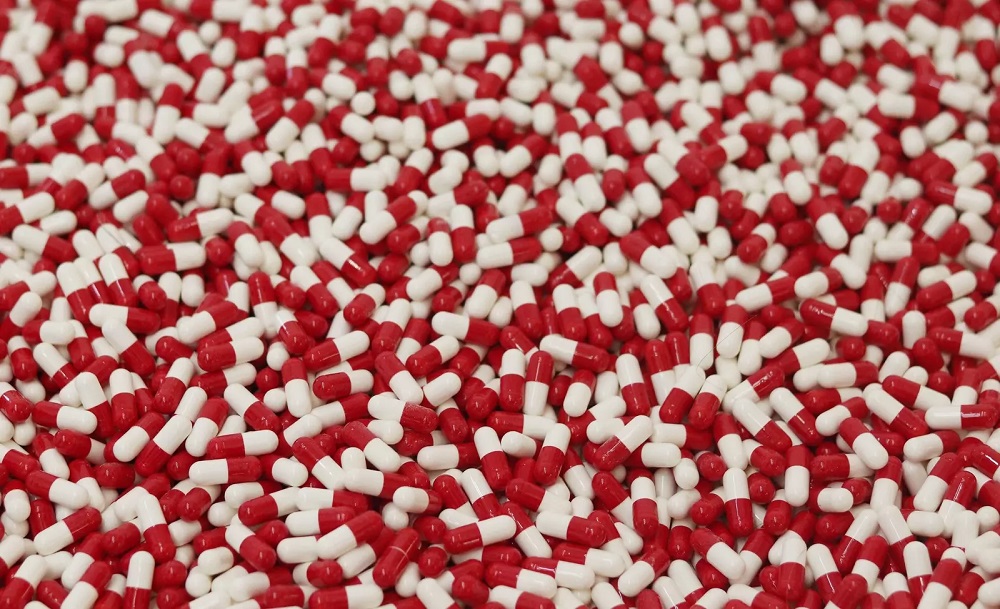
Third-generation capsules: What lies ahead for drug delivery
Third-generation capsules: What lies ahead for drug delivery
• Capsules offer benefits over other forms of medication, including ease of self-administration, precise dosing and targeted delivery.• They can be used to treat a range of conditions and produced at lower cost than other dosage forms, with a longer shelf life.• Advances in combination liquid fill and two-in-one capsules look set to revolutionize drug delivery to the benefit of all.The story of modern-day healthcare is often told through the lens of drug-development in medical sciences, and rightly so. However, the role of pharmacology and drug delivery systems cannot be overstated.In the last four decades, capsules have emerged as a crucial device for advancing healthcare across continents. They offer obvious benefits over other forms of medication, including ease of self-administration, precise dosing and targeted delivery.They are used to treat a range of conditions and can be produced at a lower cost than other dosage forms. They also have longer shelf life, are easier to store and transport to the last mile – other benefits include taste masking, as well as being aesthetically pleasing and tamper evident.Capsules have been around for more than 100 years and, with an impeccable track record and with billions of units manufactured every year, they lead the fight to make medication more safe, accessible and affordable in high- and low-income countries alike. As the world's population grows and ages and diseases rise, the humble capsule also evolves.A couple of Frenchmen are credited with patenting the capsule in 1834 – a small gelatine shell enclosed with a drug, released after ingestion. In their early days, what we called the first-generation, capsules were unstable, prone to cracking and leaking, unpackaged and thus unsanitary and thereby potentially dangerous for patients.Absence of automated filling machines also created limitations on how many capsules can be filled manually and stuck together by workforces. I personally have had a front-row seat to the evolution of capsules.Advances in capsule technologyAdvances in technology led to the development of packaging that has added shelf life, making them more stable and reliable, and the advent of automated filling machines increased productivity, decreased human intervention making them more hygienic and reducing possibilities for human error.Cut to 2000s, the second generation of capsules really pivoted and scaled from animal-based gelatine to plant-based cellulose. Though the technology existed previously, enhanced scale made these capsules more accessible to people with dietary restrictions and addressed ethical concerns on animal products.Capsules are no longer limited to delivering drugs in powder form, as advances in materials and manufacturing have led to diversification in ingredients that can be encapsulated. They are a versatile drug delivery system that can be used to deliver various formulations, including granules, pellets, pastes and even liquids.Not just for humans, capsules have evolved for making animals drug delivery easier. Flavouring to improve the intake of capsules is another catching trend, which is used for making medicines for pets and cattle.Advances in materials and manufacturing processes have led to a diversification in the kind of ingredients that can be encapsulated. The shell of a capsule can be leveraged to design capsules for delayed-release and targeted-release of drugs in the body, enhancing the efficacy of the medication. Manufacturers can also make specific capsule shells that protect the ingredients inside against degradation, thus improving the shelf life of finished products.Combination fill capsules the next revolutionToday we are at the precipice of revolutionizing this technology once again. Advances in combination liquid fill solutions and the probability of scaling world’s first two-in-one (any combination pellets with liquid, or pellets with powder or liquid with liquid, the combinations are versatile) capsule product with a movable membrane, is now a possibility.Collectively these capsule technologies will usher in a new era in new combinations of dietary supplements, and even non-prescription or over-the counter remedies as well as prescription medicines to be delivered in a single dose. Research has shown that water and fat-based liquids are often necessary for the proper absorption of active ingredients in the digestive system.By providing these components in the liquid portion of the capsule products, the bioavailability – the ability of a drug or other substance to be absorbed and used by the body – of the key ingredients can be considerably improved. The more bioavailable a product is, the greater its beneficial effect on the body. As a result, lower dosages may be required, side effects are potentially reduced, and the efficiency of delivery is substantially boosted.This revolutionary breakthrough also allows previously nonviable combinations to be delivered simultaneously. Various liquids, including oils, can be contained within a product together with other active ingredients. This allows for a single capsule to deliver multiple ingredients, resulting in an unprecedented level of convenience and an innovative product delivery. This technological breakthrough is a solution to current formulation challenges with many combination therapies, including incompatible ingredients or molecules.In the end, we are left with one question – what can you buy today for $0.20, which is reliable, safe to consume and helps you get better? That you trust the health of your family with? Capsules are arguably the safest and most reliable way to deliver medicine and as the march of progress continues in the fields of science and medicine, they continue to offer opportunities for innovation and will remain relevant in the years and decades to come. Source: https://www.weforum.org/agenda/2023/05/next-gen-capsules-drug-delivery/
Read more

Ajit Singh
Ajit Singh earned his graduation degree from Cambridge University, UK, and post-graduation degree from Harvard Business School, USA. He currently resides in Mumbai, India, and travels widely to study pharmaceutical and allied industries.
Ajit is the Chairman of the ACG Group (formerly known as the Associated Capsules Group of Companies), which is headquartered in Mumbai. He has played a prominent role in the development of the pharmaceutical and allied industries in India and has served as an executive committee member of the Federation of Indian Chambers of Commerce & Industry (FICCI), a regional council member of the Confederation of Indian Industry (CII), Western Region, and other prominent pharmaceutical associations in India. He has also been conferred with prestigious awards for his contributions and thoughtful leadership to the pharmaceutical industry.
Ajit was a founder-member of the Young Presidents’ Organization – India Chapter and the first Indian to be invited to serve on its international board in the USA.

Jasjit Singh
Along with his brother, Ajit, Jasjit started the Associated Capsules Group in Mumbai in 1962.
Jasjit has always been interested in technology – particularly that relating to machine design – and earned a degree in Mechanical Engineering from London University. He has dozens of patents to his credit, and under his leadership the ACG Group has received numerous global awards for technology, excellence and social welfare.
Jasjit has been actively involved with starting new Forums of the Young Presidents’ Organisation. He served as the Chairman of the Mumbai Chapter, and helped found the Kolkata Chapter before becoming a founding President of the World Presidents’ Organisation. Jasjit has also received the Vijay Ratna Award for leadership in Industry, and recognition from UNIDO for his contribution to the fields of pharmaceutical technology and environmental science.
Jasjit’s other interests include self-education, reading, music, collecting rare works of arts and helping young contemporary artists, cooking, and travelling to different parts of the world – especially with his family.

Karan Singh
An organisational psychologist by education, Karan has transformed ACG from a modest Indian business into a world-renowned institution, revolutionising its vision and long-term strategy to ensure global growth. Karan has overseen ACG’s remarkable digital transformation, adopting breakthrough technologies that not only keep medicines safe, affordable, and accessible – but also vastly improve manufacturing and supply chains. Meanwhile, he has led a series of tuck-in acquisitions that ensure ACG pioneers continuously in terms of innovation and scale.
Passionate about converting ideas into growth opportunities, he supports entrepreneurial visions that solve real-world challenges. As an investor and mentor to more than 35 health-tech start-ups, guiding strategy, technology, expertise and networks, Karan seeks to consolidate the next generation of leadership – one that will secure better access and bridge availability across the global health industry.
Karan serves on the India Advisory Board for the India-Brazil Chamber of Commerce, is Co-Chair for FICCI LAC Regional Council, a key advisor to Nasscom, and an active contributor to the Global Lighthouse Network community of the World Economic Forum. Years of keen basketball-playing underpin his leadership, communication, and competitive spirit, and have brought about ACG-NBA Jump, a grassroots programme to give Indian basketballers a global platform.

Selwyn Noronha
CEO ACG CAPSULES

Selwyn Noronha

Nikhil Kulkarni
CEO ACG ENGINEERING

Nikhil Kulkarni

SR Shivshankar
CEO ACG PACKAGING MATERIALS

SR Shivshankar
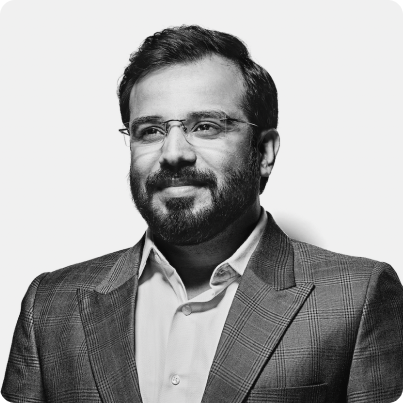
Udit Singh
CEO ACG INSPECTION

Udit Singh

Sunil Jha
Chief Human Resource Officer

Sunil Jha

Werner Bongers
CEO SCITECH

Werner Bongers

Nitin Desai
Chief Commercial Officer

Nitin Desai

Parag Shah
Chief Financial Officer

Parag Shah

Shankar Gupta
Chief Sales Officer

Shankar Gupta

Balajikasiram Sundararajan
Chief Digital Officer

Balajikasiram Sundararajan

Alexander Robertson
Chief Marketing Officer

Alexander Robertson
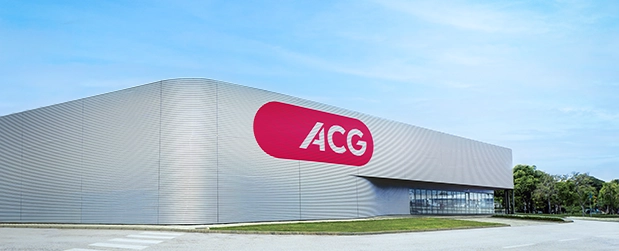
Boilerplate
For over 60 plus years, ACG has been innovating the production solutions for pharmaceutical and nutraceutical companies, that help make people better.
As the world’s most integrated provider of oral dosage products and services, we produce capsules, barrier packaging materials, manufacturing machinery, and visual inspection and traceability solutions. All fully compliant with international standards.
Today, ACG fosters long-term collaborative partnerships with customers in 138 countries across six continents.
Together, we share a common purpose: to solve the world’s greatest health challenges and make it better for everybody we serve.




